Comic books, books, ships, movies, tv shows, and more
Last active 2 hours ago
Don't wanna be here? Send us removal request.
Text
Marc Spector: Moon Knight

We got to meet Marc, Steven, and Jake in the first Moon Knight run. But now it’s 1989, and it’s time to get reacquainted with the character.
For his second attempt at leading a solo book, Moon Knight discards his additional personas. It comes right after his stint as a West Coast Avenger, so he comes into this story all polished and frankly, simplified.
Without Steven and Jake, Marc is literally just himself – still living in a Long Island mansion, still hanging out with Marlene (who occasionally leaves him) and Frenchie (who sticks around), still dressing up as Moon Knight and hemorrhaging money for his pricey hobby.
Who is Marc Spector?

While reviewing the first run, I did mention that Marc didn’t have enough of a presence in the story. It mostly went between Steven, Jake, and Moon Knight. But this one is all Marc. At the beginning of the run, right as it found its core theme, Marc was dealing with the echoes of his mercenary past. In fact, he went through nearly all of his old nemeses: from Bushman to Raposa, and his brother Randall.
He had to confront the results of his mercenary work, and in the case of Raposa, it was quite literally. Marc was arrested and sentenced to death for assassinating the then-acting president of Bosqueverde. He might’ve spent only a short time in prison, but that did give him enough room for reflection. As a mercenary, Marc killed for money, but he still had a conscience – it’s just the consequences that didn’t bother him, and even that until he could see them up close. Writers took extra care, making sure that Marc’s past, while shady, does remain redeemable. And it’s redemption he’s looking for.
The road to redemption

Throughout this run, Moon Knight redefines his understanding of Khonshu and what the Moon God even wants from him. Of course, without Khonshu there to actually answer Marc’s questions, he has to assume, and that leads to several (short but meaningful) eras in his career. An encounter with Scarlet makes a lasting impression on Marc. That same lady of Vengeance from the first run reacheы out to Moon Knight, begging him to save her. All of that is draped in a shroud of mystery, hinting at a mystical link between the two. Like any controversial figure, Scarlet attempts to kill Marc but ultimately either drowns or convincingly fakes her own death.

That’s enough to reawaken Marc’s guilt, so he decides that he needs to help the baddies find Khonshu (and their own conscience). Needless to say, they aren’t very cooperative.
For a while, Moon Knight struggles to force his villains to repent, and neither Frenchie nor Marlene is happy about that. So… you guessed it, Marc goes back to his old ways. It’s the status quo, after all.
Sidekick is the worst job ever

For some time, Marc shares his adventures with a faithful sidekick. Because what superhero doesn’t? It’s not just any old boy from the streets, it’s the son of Midnight – one of Moon Knight’s greatest foes you can barely recall from the first run. Jeff (the kid’s name) is eager not to become like his father and to bring justice to the streets of New York. Marc… well, he can’t wait to get rid of the kid. And that he does — Midnight gets captured by Secret Empire (a whole cabal of baddies) and turned into a weapon. In other words, the destiny that befell so many sidekicks before Jeff.
Naturally, Midnight comes back to bite Moon Knight in the ass, but it’s not like he has any lasting effect on Marc. He has to move on, after all. Especially considering that by the end of the run, he’s dealing with Templars and Infinity Watch, while his bff becomes the Bloodline (don’t ask).
What’s that all about?

Really, this run is an experiment. It takes away everything unique about Moon Knight and tries really hard to fit him into one of the more familiar boxes. He’s almost Daredevil, almost Spider-Man, very much Batman, and almost (but not really) Punisher. By the end of the run he has a whole Shadow Cabinet working for him. A bunch of sources (to replace Jake’s diner friends), a psychologist, a cop, a mafia boss, and so on. That whole thing… it doesn’t really work. With all the experimenting, writers seem to have forgotten what makes Moon Knight interesting — his fluid identity (his DID is still not a thing at that time), his balance between mystical and mundane, and his irredeemable past. This run takes everything from him, leaving a few solid stories but no actual staying power.
P.S. This run stripped Marc of nearly everything and everyone he knew (Steven, Jake, Crawley, and Gena in particular), leaving him with Frenchie and Marlene only. But the following 1998 mini-series by Doug Moench brings them all back, restoring Moon Knight to what he was when we first met him.
2 notes
·
View notes
Text
Why I Don't Hate Ultimate Reed

Now, here’s a question for you. You’d think, with all the hate I have for 616 Reed, I’m destined to despise his Ultimate counterpart. And I’ll admit right away, he’s awful.
After having read Ultimate Fantastic Four, all the way to his downfall (but not further, not yet), I certainly have some thoughts on this incarnation of Reed Richards. But hate him? I really don’t.
Let me explain in a long way full of side thoughts.
An unwanted child

They make it a point in the very beginning to show us that Reed’s childhood was no walk in the park. Instead of nurturing his natural gifts, his father constantly yelled at him for disassembling house appliances, his mother didn’t bother to stand up for her kid, and he got relentlessly bullied at school. The only friend he ever had was Ben, and he was pretty much the only one who cared enough to defend him. This could’ve gone one of two ways: he could’ve become someone who never wanted anyone else to go through the same thing, or he could’ve sworn revenge on everyone who’s wronged him.
Reed turned out as a little bit of both.
A star pupil

When Reed got to the Baxter Building, his skills were praised and his achievements celebrated. It seemed kind of like what was happening to his 616 version; he even got the girl who, in this iteration, was a gifted scientist. Reed still got into trouble, but now, he had a trusty BFF, a girlfriend, and her tag-along brother, who, what do you know, was still good-for-nothing. If there’s a multiversal constant, it’s that Johnny Storm is a screwup.
But this ain’t about Johnny. It is, however, about Sue. I have already heard more than once that Sue leaving Reed was what kicked him over to the villain side.
But let’s not do that. Let’s not blame her for making a healthy choice for herself.
Reed was treated as a young superstar and, for the most part, his projects were not questioned simply because no one could understand what they were about. And well, if there was a military application to his discoveries… You know what’s what.

The team had many adventures, but what they called adventures, more often than not it was a global disaster and somehow always a direct result of Reed’s misguided research. On paper, he blamed himself for each and every one of them. But accepting the responsibility and avoiding making the same mistake again are not the same.
If anything, I would assume that every time he got blamed, he took it as simpletons yet again not being enlightened enough to understand his greeted purpose. That’s why he ended up dreaming of a different world, where his genius would be celebrated.
A smart friend

Many fans try to pinpoint the moment Reed turned evil. But how do you do that? It was never Sue’s fault (no freaking way in hell) by the time they met, he already had enough anger inside to use all of his inventions for the worst. As if all that hate he received throughout his childhood festered inside of him for a good decade. It was never resolved, and no one even tried to. The only time a therapist even crossed the threshold of the Baxter Building, it was a very evil version of Agatha Harkness who wasn’t even a witch but an entity hatched from an alien egg. And even she was more interested in Johnny. With his obsession with science and research, Reed naturally didn’t reflect on his own issues. And having a relatively strong support system helped keep him afloat for a while. But not for long.
An obsessed scientist

Now, people do love to blame Thanos for Reed’s asshole behavior when he got hold of the cosmic cube. But again, let’s not. He himself chose to tinker with the cube, it turned out he was always the reason for the cube’s existence. So all in all, Reed totally brought it on himself. And hey, that IS why Sue wanted time off from him. Believe it or not, Namor’s green underwear had nothing to do with that.
Reed’s guilt over having created Doom didn’t really help. No, it only pushed him further into his research and led him to discover alternative dimensions in which Doom was always an evil tyrant. Now it could be one of two things. We do know that Dooms travel the multiverse and such, helping other Dooms ascend to Doomhood, but also, would Reed ever admit that there is a Doom somewhere whose sole purpose in life is to spread love, support, and understanding? Anyway, Dooms are responsible for Dooms, and Richards couldn’t have been more self-absorbed at that moment.
An inevitable villain

Now, to the main course. I stated this in the beginning, and I’m standing by my own words. I don’t hate Ultimate Reed. I don’t, because he is the only logical solution to Reed Richards. He is Reed left on his own, he is the Reed that Reed tries to suppress. The true Reed, if you may.
That is his character growth, that is his natural path, if you consider how he approached every conflict ever, if you consider how heartless he is, and what ripples his actions send across the world. That is why Reed fears The Maker, and that is why The Maker hates Reed.
The biggest difference between Reed-616 and Reed-1610 isn’t that one has completely stepped over the line and the other hasn’t (yet). It’s that the same actions are viewed as heroic and concerning. Of course, it all becomes a warning sign only after. In the words of Carol Danvers, the world’s been attacked by a pubescent gnome, and no one saw it coming. Except they should have.
Either way, it’s the fact that we accept one as evil while another one is slowly getting his public image reinvented, as if we’re supposed to just gloss over his history.
Ultimate Reed is horrifying, just like 616 Reed should be.
#marvel#marvel comics#comics#comic books#marvel universe#long reads#fantastic four#reed richards#ben grimm#susan storm#johnny storm#ultimate universe#the maker
16 notes
·
View notes
Text
Who will rid us of Moon Knight?

It’s the 1980s and Moon Knight is just a one-time adversary-turned-ally in a Werewolf by Night comic book. He got some solo stories but he’s still mostly a question Marc (oh yes, I did). So what could go right if he got a solo book?

Moon Knight was introduced as a mysterious mercenary hired by a group of rich baddies to capture Jack Russel (the title Werewolf). They gave him the signature costume and insisted that he call himself Moon Knight — something that Marc himself didn’t quite appreciate. But this origin didn’t stick around for too long and when the time had come for Moon Knight to swing into the pages of his own title, his story changed as well. The retcon even tried to honor that early story, turning the whole thing into Moon Knight’s operation. Instead of a sudden change of heart, he now died and came back to life with the help of a certain deity. Back then, Khonshu was a silent statue that may or may not have had any extra powers. But it was enough to birth Marc’s identity crisis that later was turned into DID.
The new look

So Marc is gliding through the streets of New York, looking for trouble. Despite the city being infested with superheroes of all kinds, trouble he still finds.
When he gives up his merc ways, he adopts the persona of a rich boy Steven Grant who occasionally drives around in a cab and calls himself Jake Lockley.
There is a strong early Batman vibe during these years, only Marc is struggling with more identities. His main one is Steven but he is way more comfortable with Jake. That’s not something he admits, it’s taken out of the creator’s notes. And a part of why he refuses to confront or even consider that fact is Marlene.

Marlene is Steven’s girlfriend, and when I say Steven’s I mean just his. Jake calls her “lady”, and with Marc, it’s even more complicated. He was one of the mercenaries who killed her father, he was also the one who saved her from the same fate and we never learn how, but they do end up together. Marlene is the 1980s version of a badass – she fights, she’s not helpless, and while she does occasionally try on the flowery hat of a damsel in distress, that doesn’t happen often.
In the beginning, she mostly waits for him by the bathtub (and I’m not joking, Steven has a bath in his bedroom and that bath serves as a secret entrance for Moon Knight). As the story progresses, though, we learn more about her but we’ll get to that.

We mostly don’t interact with Marc - he is the one side MK is running away from and considers to be dead. Truth is, he replaced Marc with both Jake and Moon Knight. One satisfies the thirst for violence and the other is a simple down-to-earth guy, just like Marc was. Marc himself, he died in that tomb next to the statue of Khonshu.
Marc’s lifestyle is what’s put a rift between him and his family, it got pretty bad too but what I like is that he doesn’t get that beautiful reunion. He doesn’t get anything — he can’t make peace with his brother or his father. Marc has to live with his mistakes lingering around him and that’s another reason he’s so eager to become someone else. If it was up to Marlene, he’d stay as Steven and give up Moon Knight. But we know better, he can’t do that (the Moon will haunt him). The only part of Marc MK is not getting rid of is ironically the baddies from his past.
Backup dancers
Moon Knight is trying to help everyone else and fails quite often at that. I think that’s what I like about him. He can compromise, he operates in the grey area where he can let a murderer go if the murder is justified. His justice is never black-and-white. Like the Moon, it has spots.
But he has a backup team to keep him balanced. To help all three personas survive and function.
Marc has his old friend Frenchie. Frenchie hangs around the helicopter waiting to pick up MK from wherever and the only thing we really know about him is that he had the love of his life and he lost her.
Steven has Marlene.

But Jake is the most outgoing of all. He hangs out at Gena’s diner, where he orders food and never eats it. He comes to Crawley (a street dweller) for information, and he even knows a cop (although that’s Moon Knight).
It’s a big cast of characters and all of them get their own moments in the center of the story. Those moments though, are often tragic.
Crosses

While other comics of the time are careful with death, this one never shies away from it. Almost every character has a loss to face and each story is quite brutal. Redemption is never a given, certainly not for everyone, and that’s the leitmotif of the whole run. The good fight never truly stops not for Moon Knight, not for anyone. There probably isn’t enough good for Marc to do to erase his past.
MK’s early stories have a similar vibe to Ann Nocenti’s Daredevil run. It’s always something socially relevant, from nazi sympathizers to crime on the streets as a result of poor economy. Moon Knight is a hero of the people, and his baddies are either unfriendly neighborhood criminals or some overseas crime lords.
As the run finds its rhythm though, the genre changes. It now borders on mysticism and touches upon horror without crossing the lines of realism. It maintains this grounded approach, the possibility that it all could actually happen. In the world of Khonshu, Moon Knight is still very skeptical when it comes to magic, so his team-up with Strange feels like a door to the bigger universe of superheroes, not just street vigilantes.
Brushes

There is no talking about Moon Knight without his significant look. For half of the run Bill Sienkiewicz serves as the lead artist, and that’s reason no.1 why this run is a must-read. If nothing else (and there is definitely something else), then check it for the stunning art. You can see how with every issue the visual style matures and changes, finding the perfect tone and balancing between impressionism and pop art. There is magic in these panels, and it makes more sense to see them than to talk about them.
Stunning covers are present too.
Early Moon Knight is not Moon Knight as we know him today. It’s a different book and it’s a product of the 80’s. It’s a special vibe and something you have to be ready to submerge into. If you are, you’re gonna have a hell of a great time.
15 notes
·
View notes
Text
The title is literally “Why I hate Reed”. Talk about media literacy…
Why I hate Reed
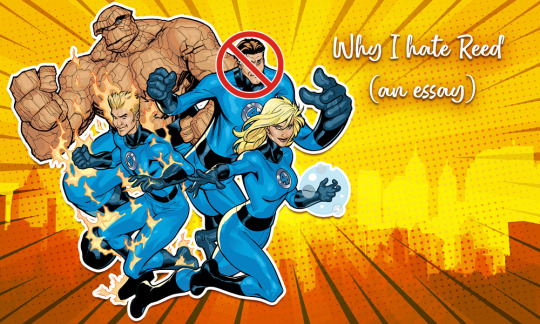
Fantastic Four has a long history of disaster after disaster. Most of the disasters in question were caused by Reed. Bet you didn’t expect me to jump right into it.
Okay, fine, let’s do an introduction first.
Fantastic Four has been a Reed-centric story since the day he broke ground on Marvel-1 (known at the time as just a rocket) and took his bff, girlfriend, and her tag-along brother on a ride, to the day his arch-enemy took over the world (that was last week). It’s all about Reed and everyone else just happened to get stuck with him.
I hate Reed. Maybe not as much as Doom does, but it’s close.
I have my reasons.
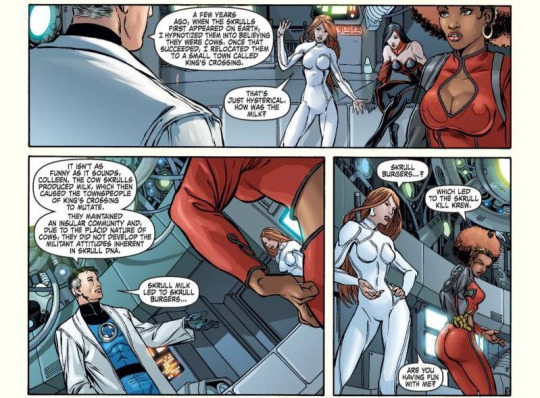
If you know Reed well, chances are, you also hate him. If you don’t know him, you’re lucky. If you don’t hate him… keep reading.
Reed has always been always the intended protagonist of the Fantastic Four. They might have called it a family book but really, you tuned in every month to find out who is bugging Reed and whether he manages to fix everything this time. That’s who he is, he fixes everything. Mostly through the power of science, occasionally by stretching in the most ridiculous way.
Reed is recognized by CB writers as a hero, not just a hero in a cape and mask sense (he doesn’t even wear those) but the cool-headed, smart guy, the focal point of the team and the narrative. You are supposed to see yourself in him and imitate his approach.
Everybody cares about him, everybody talks about him, and in those rare moments when he’s presumed dead, everybody mourns him.
But Reed just isn’t a good person. There are things about him that don’t just fail to align with heroism, they’re plain vile.
He’s a liar
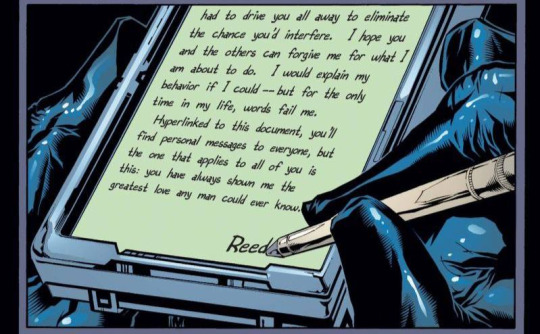
Reed is a liar. It’s not just that he omits relevant details like, say, forgetting to inform the whole team that they are slowly dying, or warning them that he’s keeping a dangerous gate in the basement. This is absolutely a pattern with Reed and instead of getting mad at him, people just accept it as a part of his character. Even if they do get pissed off, they eventually forgive him. Then all of that repeats. To be fair, I probably should be more mad at the dysfunctional family that enables his behavior.
But it’s still him. The logical path he loves so much to take inevitably leads him to the conclusion that it’s time for yet another lie. He’s not above covering one lie with another, and it comes off almost childish (not in the adorable sense). What I mean is, he is afraid of being judged because he knows what he’s doing is wrong but he simultaneously believes that he is right because he knows better. Again, this comes down to him claiming to be the smartest man on Earth. Which is ridiculous. The smartest man in physics is still the stupidest when it comes to art or magic. And he admits both things himself yet refuses to accept the fact that he knows almost nothing.
Besides, both his daughter and Lunella are easily smarter than he is.
He’s a hypocrite
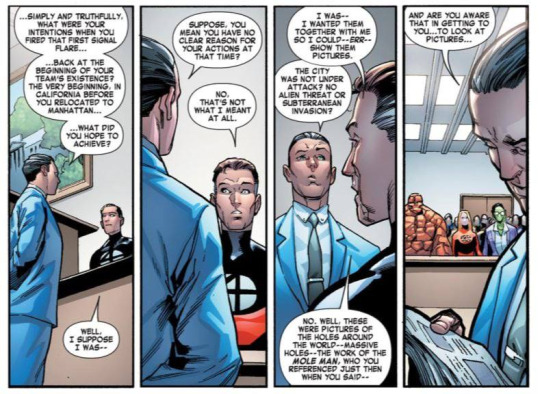
Reed is a terrible hypocrite. We don’t talk about that often, because the stories that allow you to notice that lie far apart. During the Civil War, he was all happy to serve the government. It is a big part of his life, he’s always been ‘public’ and ‘legitimate’. In the eyes of the law anyway. So when the question of whether or not to register appeared, he made a call for everyone. Happily so, and he went along with punishing everyone who opposed it. Except for his family, of course. It smells awfully similar to the way dictators operate so I guess we should be thankful Reed doesn’t have those ambitions.
But when the tables turn and Reed has to answer for all he’s done, he believes that he is judged harshly. Of course, it turns out to be a villain’s plot but he never really stops to think how his actions were questionable at best. And he isn’t prepared to take responsibility the same way he expected others to. He thinks it’s unfair.
He’s a garbage person
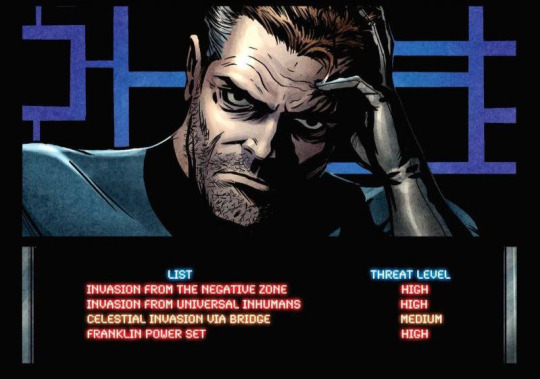
Essentially, the problem is Reed not knowing when to stop. Reed is stubborn, we already know that. He is convinced that he knows what is best for everyone. He believes that his view of the world and how things should be is the correct one. The mathematically correct one, I mean, he did write all those equations on all those walls. This is what eventually led to the Civil War, and this is what eventually led to the Secret Wars. The two most notable events on 616. Reed’s math allegedly allowed him to predict the future, and in that future, he saw Doom. JK but he did see that superheroes will destroy the world if they keep on unchecked. And he did see the possibility of incursions. So he built 42 and threw his friends there. He experimented on Speedball to the point of torture because the government said it was ok. He got together with the Illuminati pre-Secret Wars convinced that they could definitely stop the incursions and they failed. They would’ve gotten everyone killed and, big shocker, the only ones he ended up saving were himself and his family (although Justice finally said “Hell no!’ and his family perished.)
But Reed sure knew what was right.
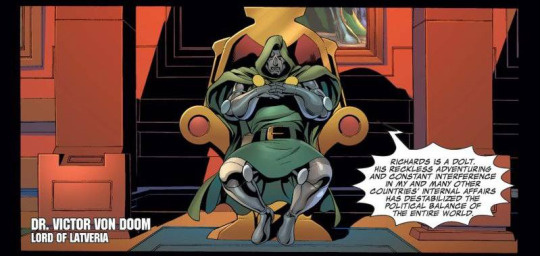
With that same attitude of knowing what’s best, he stomps around Latveria, trying to liberate it. He returns there every time and every time acts surprised when he discovers that Latverian people don’t want his liberty. They don’t want him, they like Doom.
I feel like deep down Reed believes that his unique intellect allows him to see things more clearly than any of us mortals. And because of that, everyone should sleep well, putting their trust in him. Whether he invents another doomsday device (and promises not to use it), keeps Ultimate Nullifier in his nightstand, or stores a gate to anywhere in his basement. Everyone is supposed to trust him until turns out that his 3-year-old accidentally opened it. That’s happened a few times and if anything, we should know by now that Reed is anything but trustworthy.
He never stops to think “Should I?” Because the answer is pretty much always “No.”
He’s an awful husband
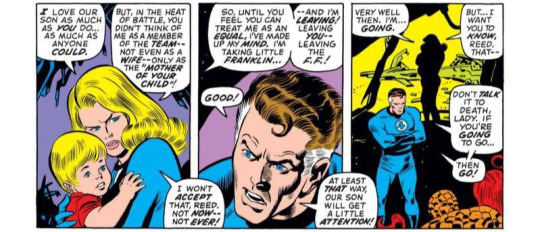
Back in the day, Sue often ended up on the other side of Reed’s outbursts. His smug attitude toward her was always uncomfortable, to say the least. He diminished her and everything she did because he deemed it irrelevant. It barely changed until the writers elevated her almost to his level by making her a doctor of Archaeology. While I appreciate them giving her some interests other than making sandwiches for everyone who resides in the BB, does it mean that they agree with Reed? That everything she did, whether she wanted to be an actress, ran their company, charities, or simply stayed at home with the kids, is not good enough? It makes sense in terms of their shared interests, but the only thing it gives me is doubts about him even loving Sue. Unfortunately, it seems like he sees her as a trophy wife he never could’ve gotten. When he talks about Sue, he often says that he studied her, like she’s an object that fascinates him. This kind of explains why he can’t relate to her, refuses to trust her, and doesn’t always care how his actions would affect her.
When Sue was Malice, everything she told him was pretty genuine. There is a trope where heroes say the worst things under the influence, yet these things are rooted in reality. And that’s what happened here.
There was another piece of truth Reed got when Johnny had a fight with Sue (about keeping from him the fact that the whole team’s powers were deteriorating, and their bodies too), he told her “You’re treating me like he treats you!” Reed didn’t react and that was never addressed again. Too bad, we all know that’s true. Reed has no respect for Sue. Even Reed knows that, I just don’t think he gets it.
Let’s not forget that Sue served him divorce papers. What a time that was.
He’s a terrible father
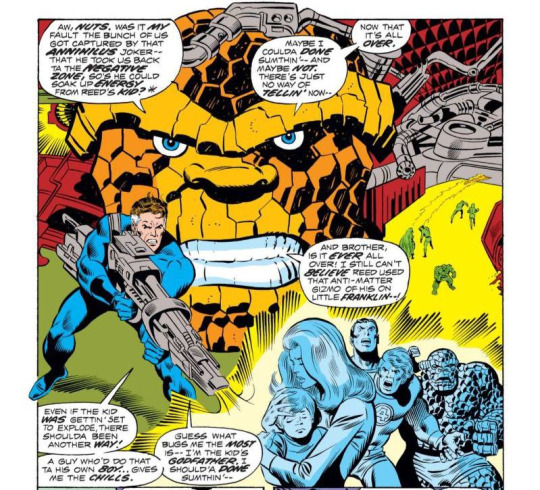
He starts out as an oblivious parent who doesn’t really care. As long as the kid can’t speak it’s not his problem, right? Hence multiple babysitters and Franklin spending half of his childhood with Agatha, in Attilan, and at Alicia’s place. Franklin is a creator, not a scientific one either and that’s something Reed can’t understand. That’s why he’s been having a hard time even connecting to his son. Okay, he might not be the easiest kid to connect to but with the constant neglect he’s experienced, no wonder he feels like a disappointment to everyone.
Val has a good father, Doom. He’s actually more of a parent to her than Reed, even if she’s the child Reed actually likes. Unless that’s just him being possessive. Just like with Sue (whenever she had her Namor eras) Reed is jealous of Val’s bond with Doom and as soon as he feels like he’s losing her, he gets mildly irritated. That’s exactly it, he’s not even properly furious – he just gets upset and focuses on work.
Even all the family adventures they went on, or that time after Secret Wars when Reed decided that Ben and Johnny should believe their family is dead (including the kids), couldn’t make up for that. After all, Reed probably spent more time in his mobile lab than with kids. And when he got bored he happily ditched everyone except Frank and Val. So much for calling them all “their kids”. They are better off anyway because Reed doesn’t consider their feelings. At least he treats them like adults, since he doesn’t consider them either.
He’s unkind and a trash friend
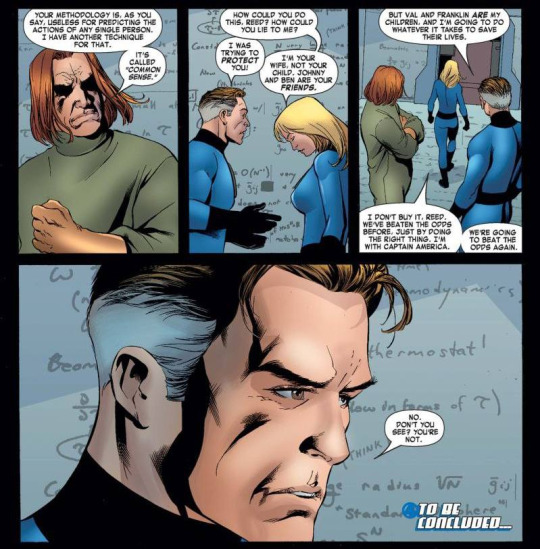
There is no genuine kindness in Reed. It’s almost like he pretends to be a loving husband, parent, and friend.
Reed has no respect for his family or friends. If he had, he would’ve considered them whenever he made a decision. Again, it comes back to him believing he can’t make a mistake (check how long he’d been agonizing over the first space mission). Yet the vast majority of Reed’s actions vary from mean to straight-up creepy.
Even the seemingly selfless gesture of turning his team into celebrities was his pathetic plea out of guilt. He never asked any of them whether they even wanted to be famous or heroes. He felt guilty (that’s something, I guess) for turning Ben into The Thing, and complicating things for Sue and Johnny (although, they probably would’ve been fine).
But that’s a pattern that follows Reed everywhere and everybody ends up getting hurt.
Despite claiming to love his wife and kids, care about his friend, and tolerate Johnny, he is unkind to them. He views and moves them as pawns to where he wants them to be, all the while faking the perfect family man and good friend facade. And that’s the new Reed, the old one barely pretended.
Let’s face it, Reed and Ben don’t have much in common except the collective trauma of getting powers and fighting Doom. The funny part is, Reed wants to be friends with Doom but Doom sees through his BS (okay, I might be giving props to the dictator here but ain’t he right?)
He’s way too full of himself
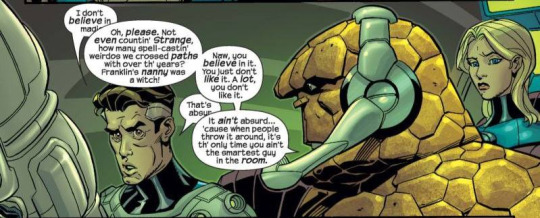
The self-proclaimed smartest man on Earth, Reed lives in the world of science. He is obsessed with math and he believes that math will solve everything. Spoiler: it won’t. He knows that, too. When Doom kidnaps his family and locks baby Franklin in Hell, Reed wastes so much time arguing with Strange over his aptitude for magic, that the kid ends up traumatized. For a while Franklin couldn’t tell the difference between Hell and Reality, all because his father couldn’t accept that he doesn’t know everything.
This is absolutely a pattern with Reed — he doesn’t believe in ghosts, vampires, probably even werewolves. Meanwhile, he knows actual gods and had a witch for a nanny. If anything, this is a sign of stubbornness and that’s one of the worst barriers for wisdom. So good at math he might be, a genius — I don’t think so. That’s not all there is to it, because there are absolutely people smarter than Reed with a more flexible mind. I have to give points to him for recognizing that eventually and forming Future Foundation but he still has ways to go. So far, math has been a source of trouble more often than not. His inventions and his equations that predict the end of everything force him to take the most ridiculous approach in trying to solve problems before they arrive. And if that’s how we see Reed, imagine how irritating it is to Doom.
And while we’re at it, they might have changed the origin so that Reed’s original calculations weren’t incorrect but that was wrong. The poetic justice of math, the only thing he truly trusted, betraying him, that was beautiful. If only Reed could understand art.
He’s dull
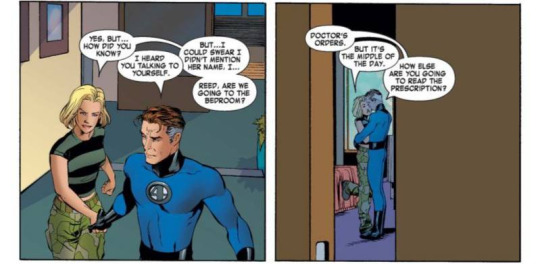
Let’s face it, they can rewrite Reed’s history, they can try to make him fun, they can even hire a really good actor to play him, but Reed is incredibly dull. He’s boring and even his family doesn’t pretend he isn’t. He is not charming, has zero charisma, not funny, and really he’s extremely lucky he managed to get Sue to marry him (because with his other bad qualities and lack of charm idk what that was, unfortunate chemistry?) He’s even more lucky Ben was out of other options friend-wise, and Johnny was just around. Otherwise, Reed would’ve died alone which is frankly, what he very much deserves.
That’s not even half of his misdeeds, just the ones that were on the top of my mind. But trust me, if you spend almost a year reading about this guy, you will likely hate him just as much.
148 notes
·
View notes
Text
Why I hate Reed

Fantastic Four has a long history of disaster after disaster. Most of the disasters in question were caused by Reed. Bet you didn’t expect me to jump right into it.
Okay, fine, let’s do an introduction first.
Fantastic Four has been a Reed-centric story since the day he broke ground on Marvel-1 (known at the time as just a rocket) and took his bff, girlfriend, and her tag-along brother on a ride, to the day his arch-enemy took over the world (that was last week). It’s all about Reed and everyone else just happened to get stuck with him.
I hate Reed. Maybe not as much as Doom does, but it’s close.
I have my reasons.

If you know Reed well, chances are, you also hate him. If you don’t know him, you’re lucky. If you don’t hate him… keep reading.
Reed has always been always the intended protagonist of the Fantastic Four. They might have called it a family book but really, you tuned in every month to find out who is bugging Reed and whether he manages to fix everything this time. That’s who he is, he fixes everything. Mostly through the power of science, occasionally by stretching in the most ridiculous way.
Reed is recognized by CB writers as a hero, not just a hero in a cape and mask sense (he doesn’t even wear those) but the cool-headed, smart guy, the focal point of the team and the narrative. You are supposed to see yourself in him and imitate his approach.
Everybody cares about him, everybody talks about him, and in those rare moments when he’s presumed dead, everybody mourns him.
But Reed just isn’t a good person. There are things about him that don’t just fail to align with heroism, they’re plain vile.
He’s a liar

Reed is a liar. It’s not just that he omits relevant details like, say, forgetting to inform the whole team that they are slowly dying, or warning them that he’s keeping a dangerous gate in the basement. This is absolutely a pattern with Reed and instead of getting mad at him, people just accept it as a part of his character. Even if they do get pissed off, they eventually forgive him. Then all of that repeats. To be fair, I probably should be more mad at the dysfunctional family that enables his behavior.
But it’s still him. The logical path he loves so much to take inevitably leads him to the conclusion that it’s time for yet another lie. He’s not above covering one lie with another, and it comes off almost childish (not in the adorable sense). What I mean is, he is afraid of being judged because he knows what he’s doing is wrong but he simultaneously believes that he is right because he knows better. Again, this comes down to him claiming to be the smartest man on Earth. Which is ridiculous. The smartest man in physics is still the stupidest when it comes to art or magic. And he admits both things himself yet refuses to accept the fact that he knows almost nothing.
Besides, both his daughter and Lunella are easily smarter than he is.
He’s a hypocrite

Reed is a terrible hypocrite. We don’t talk about that often, because the stories that allow you to notice that lie far apart. During the Civil War, he was all happy to serve the government. It is a big part of his life, he’s always been ‘public’ and ‘legitimate’. In the eyes of the law anyway. So when the question of whether or not to register appeared, he made a call for everyone. Happily so, and he went along with punishing everyone who opposed it. Except for his family, of course. It smells awfully similar to the way dictators operate so I guess we should be thankful Reed doesn’t have those ambitions.
But when the tables turn and Reed has to answer for all he’s done, he believes that he is judged harshly. Of course, it turns out to be a villain’s plot but he never really stops to think how his actions were questionable at best. And he isn’t prepared to take responsibility the same way he expected others to. He thinks it’s unfair.
He’s a garbage person

Essentially, the problem is Reed not knowing when to stop. Reed is stubborn, we already know that. He is convinced that he knows what is best for everyone. He believes that his view of the world and how things should be is the correct one. The mathematically correct one, I mean, he did write all those equations on all those walls. This is what eventually led to the Civil War, and this is what eventually led to the Secret Wars. The two most notable events on 616. Reed’s math allegedly allowed him to predict the future, and in that future, he saw Doom. JK but he did see that superheroes will destroy the world if they keep on unchecked. And he did see the possibility of incursions. So he built 42 and threw his friends there. He experimented on Speedball to the point of torture because the government said it was ok. He got together with the Illuminati pre-Secret Wars convinced that they could definitely stop the incursions and they failed. They would’ve gotten everyone killed and, big shocker, the only ones he ended up saving were himself and his family (although Justice finally said “Hell no!’ and his family perished.)
But Reed sure knew what was right.

With that same attitude of knowing what’s best, he stomps around Latveria, trying to liberate it. He returns there every time and every time acts surprised when he discovers that Latverian people don’t want his liberty. They don’t want him, they like Doom.
I feel like deep down Reed believes that his unique intellect allows him to see things more clearly than any of us mortals. And because of that, everyone should sleep well, putting their trust in him. Whether he invents another doomsday device (and promises not to use it), keeps Ultimate Nullifier in his nightstand, or stores a gate to anywhere in his basement. Everyone is supposed to trust him until turns out that his 3-year-old accidentally opened it. That’s happened a few times and if anything, we should know by now that Reed is anything but trustworthy.
He never stops to think “Should I?” Because the answer is pretty much always “No.”
He’s an awful husband

Back in the day, Sue often ended up on the other side of Reed’s outbursts. His smug attitude toward her was always uncomfortable, to say the least. He diminished her and everything she did because he deemed it irrelevant. It barely changed until the writers elevated her almost to his level by making her a doctor of Archaeology. While I appreciate them giving her some interests other than making sandwiches for everyone who resides in the BB, does it mean that they agree with Reed? That everything she did, whether she wanted to be an actress, ran their company, charities, or simply stayed at home with the kids, is not good enough? It makes sense in terms of their shared interests, but the only thing it gives me is doubts about him even loving Sue. Unfortunately, it seems like he sees her as a trophy wife he never could’ve gotten. When he talks about Sue, he often says that he studied her, like she’s an object that fascinates him. This kind of explains why he can’t relate to her, refuses to trust her, and doesn’t always care how his actions would affect her.
When Sue was Malice, everything she told him was pretty genuine. There is a trope where heroes say the worst things under the influence, yet these things are rooted in reality. And that’s what happened here.
There was another piece of truth Reed got when Johnny had a fight with Sue (about keeping from him the fact that the whole team’s powers were deteriorating, and their bodies too), he told her “You’re treating me like he treats you!” Reed didn’t react and that was never addressed again. Too bad, we all know that’s true. Reed has no respect for Sue. Even Reed knows that, I just don’t think he gets it.
Let’s not forget that Sue served him divorce papers. What a time that was.
He’s a terrible father

He starts out as an oblivious parent who doesn’t really care. As long as the kid can’t speak it’s not his problem, right? Hence multiple babysitters and Franklin spending half of his childhood with Agatha, in Attilan, and at Alicia’s place. Franklin is a creator, not a scientific one either and that’s something Reed can’t understand. That’s why he’s been having a hard time even connecting to his son. Okay, he might not be the easiest kid to connect to but with the constant neglect he’s experienced, no wonder he feels like a disappointment to everyone.
Val has a good father, Doom. He’s actually more of a parent to her than Reed, even if she’s the child Reed actually likes. Unless that’s just him being possessive. Just like with Sue (whenever she had her Namor eras) Reed is jealous of Val’s bond with Doom and as soon as he feels like he’s losing her, he gets mildly irritated. That’s exactly it, he’s not even properly furious – he just gets upset and focuses on work.
Even all the family adventures they went on, or that time after Secret Wars when Reed decided that Ben and Johnny should believe their family is dead (including the kids), couldn’t make up for that. After all, Reed probably spent more time in his mobile lab than with kids. And when he got bored he happily ditched everyone except Frank and Val. So much for calling them all “their kids”. They are better off anyway because Reed doesn’t consider their feelings. At least he treats them like adults, since he doesn’t consider them either.
He’s unkind and a trash friend

There is no genuine kindness in Reed. It’s almost like he pretends to be a loving husband, parent, and friend.
Reed has no respect for his family or friends. If he had, he would’ve considered them whenever he made a decision. Again, it comes back to him believing he can’t make a mistake (check how long he’d been agonizing over the first space mission). Yet the vast majority of Reed’s actions vary from mean to straight-up creepy.
Even the seemingly selfless gesture of turning his team into celebrities was his pathetic plea out of guilt. He never asked any of them whether they even wanted to be famous or heroes. He felt guilty (that’s something, I guess) for turning Ben into The Thing, and complicating things for Sue and Johnny (although, they probably would’ve been fine).
But that’s a pattern that follows Reed everywhere and everybody ends up getting hurt.
Despite claiming to love his wife and kids, care about his friend, and tolerate Johnny, he is unkind to them. He views and moves them as pawns to where he wants them to be, all the while faking the perfect family man and good friend facade. And that’s the new Reed, the old one barely pretended.
Let’s face it, Reed and Ben don’t have much in common except the collective trauma of getting powers and fighting Doom. The funny part is, Reed wants to be friends with Doom but Doom sees through his BS (okay, I might be giving props to the dictator here but ain’t he right?)
He’s way too full of himself

The self-proclaimed smartest man on Earth, Reed lives in the world of science. He is obsessed with math and he believes that math will solve everything. Spoiler: it won’t. He knows that, too. When Doom kidnaps his family and locks baby Franklin in Hell, Reed wastes so much time arguing with Strange over his aptitude for magic, that the kid ends up traumatized. For a while Franklin couldn’t tell the difference between Hell and Reality, all because his father couldn’t accept that he doesn’t know everything.
This is absolutely a pattern with Reed — he doesn’t believe in ghosts, vampires, probably even werewolves. Meanwhile, he knows actual gods and had a witch for a nanny. If anything, this is a sign of stubbornness and that’s one of the worst barriers for wisdom. So good at math he might be, a genius — I don’t think so. That’s not all there is to it, because there are absolutely people smarter than Reed with a more flexible mind. I have to give points to him for recognizing that eventually and forming Future Foundation but he still has ways to go. So far, math has been a source of trouble more often than not. His inventions and his equations that predict the end of everything force him to take the most ridiculous approach in trying to solve problems before they arrive. And if that’s how we see Reed, imagine how irritating it is to Doom.
And while we’re at it, they might have changed the origin so that Reed’s original calculations weren’t incorrect but that was wrong. The poetic justice of math, the only thing he truly trusted, betraying him, that was beautiful. If only Reed could understand art.
He’s dull

Let’s face it, they can rewrite Reed’s history, they can try to make him fun, they can even hire a really good actor to play him, but Reed is incredibly dull. He’s boring and even his family doesn’t pretend he isn’t. He is not charming, has zero charisma, not funny, and really he’s extremely lucky he managed to get Sue to marry him (because with his other bad qualities and lack of charm idk what that was, unfortunate chemistry?) He’s even more lucky Ben was out of other options friend-wise, and Johnny was just around. Otherwise, Reed would’ve died alone which is frankly, what he very much deserves.
That’s not even half of his misdeeds, just the ones that were on the top of my mind. But trust me, if you spend almost a year reading about this guy, you will likely hate him just as much.
#marvel#marvel comics#comics#comic books#marvel universe#long reads#fantastic four#reed richards#susan storm#johnny storm#ben grimm#valeria richards#franklin richards#victor von doom
148 notes
·
View notes
Text
Fantastic Drama.

I know I say it every time, but Dan Slott’s Fantastic Four is my favorite run by far. Apparently, it’s not the most popular one, and yeah, I get why. It crosses paths with several events (Empyre, King in Black, and so on) and that tends to mess with the natural flow of the story. But I’m continuously impressed by the way this book keeps building personal stories within those events. It never forgets what it truly is about. And then, every single relationship is tested.

Every character gets a story, and no one is sidelined. That’s probably a first for the Fantastic Four, too, because someone always gets left out.
Wedding bells
It’s funny but the Fantastic Four starts bringing the actual family feel only when Ben and Alicia get married. We have all been following that relationship (I can’t bring myself to call it rocky), for in-universe decades and it’s always been a ridiculous roller-coaster where everyone knew the endgame, and everything still kept falling apart. After Johnny married Alicia (who turned out to be a Skrull, and yeah, it’s still weird) and Ben almost married whatsherface (I’m not joking, we never saw her again) it was starting to look unlikely that Ben and Alicia could ever tie the knot. But she remained a family friend and a trusted babysitter.

So we gotta give Dan Slott all the props for making this happen because the perfect family (more or less) in the Fantastic Four has never been Sue and Reed and their kids. It’s Ben, Alicia, Jo, and Nicki. It takes them one run to show up their friends, with Alicia teaching her kids (and the Richards’ evil offspring) art, with Ben denying decosmicrayifying because he was teaching his kid that it’s good to be different. And because they actually get each other. There are slip-ups, of course, because Alicia plays around with that radioactive clay (which is hello, radioactive!) and even attempts to manipulate her son, but she doesn’t do it. And of course, it doesn’t help that Jo kills Profiteer's henchman but these are all solvable issues.

And you know, this family didn’t have a storybook start. On the contrary, and we’re reminded of that in the wedding special. Ben was still recovering from becoming The Thing when they met, and he was that tantrum-throwing, childlike man. But Sue meddled, and she didn’t let him give up on that or take the choice away from Alicia. Which he’d done later anyway, but the good news is it all worked out in the end.
Their wedding is all kinds of emotional and take it from someone who isn’t a Ben Grimm fan, it was a very happy moment in Marvel history. And it’s incredibly touching.
Alicia’s a great parent right off the bat, even though she’s new to it. But what I love is that she gets a way more prominent role as a part of the family.
The bell tolls

It’s been a while since writers could find something meaningful and emotionally impactful for Johnny to go through. 60 years and all he ever managed to become was unreliable. There was a brief moment when it felt like he could change (after he returned from the Negative Zone) but that didn’t stick. He’s like an eternal teenager who fails to find his place in the world and that’s because he isn’t even trying to do that. He talks about growing up at every big family event, but he never actually makes any steps toward maturity.

But then he meets his soulmate. And It feels a little rushed with a quick retcon. But it turns out to be a pretty great story. Johnny and Sky have this across-the-universe romance that should be a fairy tale by all means.

But what do you do when you’re meant to be with someone you barely know? Johnny and Sky get to know each other, and it’s a much bigger deal for her than for him, too. It’s part of her belief system, her whole society on Spyre is matched up like that, with special bracelets that allow them to be completely in sync with their other half. Let me tell you this, no way Johnny is ready for that level of intimacy. He finds it uncomfortable and it doesn’t help that Sue is on his case (we’ll get to Sue, I got questions for her). But he treats it like another adventure. That’s all this relationship is to him.

Of course, things get much, much worse when first, Lyja shows up and still wants Johnny (girl, go), and then he sleeps with Doom’s champion Victorious right before Doom proposes to her.
Now, I gotta clarify things, of course:
Lyja is taken care of by Alicia (who naturally despises the Skrull) and a blob of radioactive clay.
Victorious has her own reasons and issues. But she’s an adult living woman who is not related to the Storms, so Johnny is into her by definition.
Doom’s marriage is a political stunt.
Sue doesn’t like Sky or Johnny and Sky together.

All of that happens in a span of several days, and it’s more than enough BS for Sky to deal with. She’s having a hard time dealing with Johnny’s exes (the number of them, to be specific). That’s something her culture doesn’t really deal with. For her, each one of his former partners was at some point his soulmate. That means she already has trust issues.
But Johnny didn’t have to go and prove her right.

He gets what’s been coming to him from Doom, he gets his powers amplified and can’t flame off. But because of those soulmate bands, that affects Sky as well and she turns into a very cool-looking (although, not from her perspective) bird lady.
We know that Johnny’s immature but honestly, this level of conscious cruelty is too much even for him. And I say ‘conscious’ because he very well knew what he was doing. He isn’t 16 and he’s been through many relationships. He’d been deceived before, and he should’ve known better than to do that to someone else. I’m not sure if this is the worst thing he’s ever done but it’s certainly up there. Reed is trash but even he doesn’t do that.
But the Stom-Richards part of the Fantastic Family… it’s like they’re all liars.
Lies, Lies, Lies.

Now there’re Reed and Sue. Instead of improving Reed, we now have a Sue who’s sneaking around on secret S.H.I.E.L.D. missions, turns invisible to spy on Johnny and Franklin, and meddles in Ben’s private life.
What’s up with that, Sue? She’s obviously been hanging out with Reed way too much cause his nonsense totally rubbed off on her.
She was right about Johnny, sure, but it’s still none of her business. He’s a grown-ass man. A stupid one, but an adult nonetheless. He has the right to make dumb decisions (and boy, does he abuse that right to death).

Still, with all that, I feel like we’re just getting to know Sue. We barely saw the sides of her that weren’t family-related. She’d been an ambassador to the Underwater kingdoms, and she ran the FF businesses (which, turns out, she’s still doing), she runs charities, too. But we rarely see any of that. We mostly encounter her in a battle, taking care of her kids, or dealing with whatever Reed’s putting her through. Oh, and she tried to be an actress, but who hasn’t?

I came to the conclusion that that’s who she is. That’s all she is; she takes care of people and that is her whole personality. I tried to dig deeper but there might not be any deeper with her. She is who she is.
More lies

I’m not even joking anymore when I say that every FF story starts with Reed lying. This man has done a lot of damage over the years, and at this point, no one should ever be surprised at his cruelty. This time, he fakes the deaths of himself, Sue, their children, and the whole Future Foundation. Forget what this did to both Ben and Johnny, but some of those FF kids actually do have sane families. But Reed doesn’t care, does he?

It truly doesn’t seem like he feels any remorse. At all. Ever. And since the run is long, Reed gets so many more chances to lie, manipulate people around him, and pretend he had their best interests at heart all along.
Why is he doing that? Who is he trying to protect? I don’t even know anymore, because all he brings people around him is hurt. And loads of it.
Throughout this run, he:
Endangers the people of Yancy Street by moving in and bringing his insane doomsday toys.
Ignores his best man responsibilities for something he could’ve delegated.
Launches a rocket out of a residential area.
Causes yet another destruction of the Baxter Building, almost getting the Fantastix (fresh new team) killed in the process.
Causes a revolution on Spyre.
“Forgets” to bring back the FF kids.
With his stellar reputation, he almost hands Bentley back into Wizard’s custody.
Promises to fix Johnny and finds a dozen reasons to not do it.
Reed needs a serious empathy course. It’s not just Franklin who needs to be in therapy, it’s Reed. And, for the life of me, I can’t understand how people keep forgiving him.
He’s the Xander of the Fantastic Four.

Now I do have a theory of why he’s like that. And that’s sort of a trope that you recognize in Stark, occasionally Beast, and other mad scientists of Marvel. They are always dancing on the brink of villainy and, in Reed’s case, it’s his family that keeps him from completely destroying the world. It’s just a theory, though, because he might do that anyway. But if his family doesn’t harass him into fixing that, he might not even bother.
How are the kids?

The Richards kids are now teens. Because of course, time runs differently, timey-wimey, and boom, they aged up. Speaking of which, compared to so many cb kids, Franklin and Val are not only growing up, but it feels relatively natural when you binge-read through the 60 years of the FF history. That sliding timescale works, y’all.

Franklin is a teen rebel: he dyes his hair black, freaks out because he’s not a mutant or powerful anymore, ends up in therapy. Which, actually, is a good thing. At least some of the family members might turn out fine.

Val has an unfortunate crush on a pointy-eared monarch (ew, no, not the same one! Namor’s not Reed), outsmarts Reed at every turn, and forges a pretty good relationship with her cousins.
Jo and Nicki are a whole other story. It’s very satisfying to see them both get over their trauma and experience love. When they call Ben and Alicia mom and dad, it’s impossible not to well up. It’s that love and wholesomeness that helps them and it’s beautiful.
The kids, all four of them (Oh, I see where this is going!), really add to this run. They are growing up to be heroes like their parents (except you, Reed). And it feels like they could be better, stronger, more caring. The only problem is, I still want Val to be the villain eventually. I mean, wouldn’t that be just awesome? Unfortunately, it’s Bentley who’s on a slippery road. But we’ll see. We’ll see.
Dan Slott brought the family aspect to the front. And many have said that it’s what the books are about, but it’s never been like this. This one has the true feel of a home, a messy but a loving one (well, except you, Reed).
11 notes
·
View notes
Text
Secret Wars: Why Reed Didn’t Win
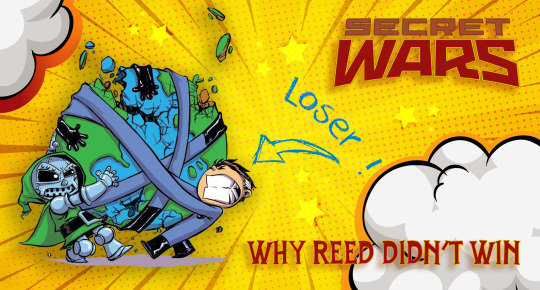
Disclaimer: This post is 100% anti-Reed propaganda and may or may not be sponsored by Latverian government.
Secret Wars is probably the most ambitious event in the Marvel Universe. Building the multiverse and the Ultimate for 15 years only to collapse it all, that’s a huge deal. And of course, Jonathan Hickman was there to see it through. With his tendency to rewrite the whole world order, we get a whole bucket of new mythology, and let me tell you, when it was first coming out, it wasn’t easy to keep all the new info in your head. Now though, that everything is released and cataloged, it’s just a matter of a free week.
So we start...

We actually start with the Fantastic Four, Avengers, and New Avengers. Those are the three “homework” reads that you need to go through to fully dive into the Battleworld and its origin. New Avengers is the more important one here since it’s tied directly to the events of Secret Wars. And that’s really the one that I wanna focus on, cause… RICHARDS.

This infuriating man is a part of the Illuminati (you’ve heard of them), and they reassemble in the face of a collision. Nay, multiple collisions with other worlds. As per habit, they choose to cover it all up and pretend that they know everything better than anyone else and get to make the calls. This was a collective work of Charles (with Beast taking over later), Strange, Stark, T’Challa, Namor, and Reed. Of course the whole ordeal stinks of Richards and Stark. It’s not the first rodeo for either and don’t for a second think that they act any differently than they have all the times before.

The solution that this intellectual elite comes up with is what they call “the unthinkable”. Makes it easier to think about it (but not to do it). To save their world, they have to kill every world (meaning the universe) that 616 is about to collide with. We care very little for a random Earth-5786 or Earth-515151 so what’s the problem? Besides, most of the universes were already dead. But there comes a moment when 616 is about to collide with a healthy world where a group of heroes is fighting tooth and nail for survival.

As good storytelling demands, we get to know them before seeing them die. But that’s not even the point. There was a superhero fight, Strange pulled a rabbit out of a hat, but ultimately, the question stood of whether to kill that universe or await the end of 616. And no one could pull the trigger. T’Challa came up to the plate and said hell nah, Richards backed out (because someone else has to save his family, apparently), everyone refused to do it, except Namor.

Which, sure, you can say he’s evil (and even list one by one all of his shady deeds), but if he hadn’t done it then, there would be no world to save. There would be no raft or Battleworld. Everyone would be dead (on both Earths). But that doesn’t sit well with heroes’ egos. Not with the way they see themselves, they all want to believe that the heroic sacrifice is better than the burden of knowing that you did the best you could under circumstances.

They all question Namor and really, thank Doom (what, too soon?) Namor was arrogant enough to be able to justify his actions and even walk away. Even alive.
What’s Namor up to

Namor goes to all the baddies, including Doom, and asks for help. Because it takes a villain to do the unthinkable. You know why? Because heroes don’t want to get their hands dirty. And in the year of our Doom 2025, we know well enough that you can’t remain clean if you want to get anywhere. But the Illuminati, for all their talk, are not just looking for an intellectual and classy solution. They know there isn’t one. So they are keeping themselves busy, trying to outsmart each other and trick the rest into doing the hard part. That’s not what all heroes would do, no. Some would die trying to save everyone, some would save who they can, but these… these guys were trying to save their conscience. And they did, while Namor was getting his hands very dirty alongside Thanos, his Cull Obsidian, and Black Swan (who turned out to be just a Doom cultist, go figure).
Namor sent Thanos to clear every Earth that was on a collision course until there were only two left. We do care for the Ultimate Earth.
Doom had other plans

Wouldn’t be fair to say that Doom orchestrated the whole shebang. Doom would probably say so, but we don’t have to believe them. Besides, we know that there was a grand design behind it all. And it included eventual destruction of all that is… was. Of all. Doom merely sped up the process and attempted to control it, which is really not a bad thing to do. It’s the same approach the Illuminati used only much more complex, layered, and clever. Don’t ever say Doom is stupider than Richards.

Doom did save the world, parts of every world in fact. He did what never even occurred to anyone else. All the Illuminati wanted was to save their hides. Or die in a blaze of glory and live forever as heroes of the multiverse. Because if you’re a skeptic and you really peel layers of care for other people, wanting to save what everyone loves, standing for everything good against everything bad… When you take it all away, there is just saving yourself and all that you love. It just happens to be in this world.
That’s why they kicked out Cap, that’s why he hunted them down.

Back to Doom though, we want to give him a hard time for taking on the role of god. We probably even want to praise Strange for not doing it. But we can only really imagine what world would it be with Strange at its helm. Strange, or anyone else acting in anonymity under seven stamps of secrecy.

The world Doom built was not ideal. Wasn’t even good, I mean, he made sure all his enemies were busy fighting for their lives. He even gave them all targets to aim their heroism at. There was always injustice, there was always someone or something to fight. What he didn’t take into account was villains. He gave them thrones but not a single one of them ever stopped eyeing his throne with envy. That’s villains for you, that’s why their Sinister Sixes and Frightful Fours never work out. It’s always a backstabbing festival, and Doom being god doesn’t change that.
Not a single Richards in sight

Doom hates Reed, which makes it hard to hate Doom. But for the most part, Reeds took care of themselves with their cursed council. So was it shocking that there were no Reeds anywhere? Not so much. It was actually a pleasant change. Doom did save Reed’s family though, the family Reed lost during malfunction on the raft. The family he claims he was ready to sacrifice worlds for.

I mean his raft was a great cover to pack all his family and a couple of extra bodies, and head for the hills to “preserve the human race” (didn’t even consider mutants or Skrulls — Reed hates Skrulls). He would’ve gotten on the raft himself (hello, genius!), would’ve packed Val there (again, genius), Franklin can remake worlds so that’s handy, and Sue… well, someone needs to cook for all the great minds? Okay, he was planning to stick her, Ben, and maybe Johnny as security crew. That was the great plan when he failed to save everyone. How is that any better than Nu-Earth, Reed? How are you any better?

Again, he failed. And everything he did after when Battleworld started falling apart, was merely piggybacking on the idea Doom had with his far more vast resources (his son. Yes, he used his child as a world maker). And it wasn’t even all his idea. Really, he should’ve come to Valeria in the first place instead of running around hiding in secret societies.
Reed didn’t win, he wasn’t a hero. He was just second. He got the time he needed to tackle the issue, he got what Namor and Doom both gave him. He failed.
#marvel#marvel comics#comics#comic books#marvel universe#long reads#fantastic four#reed richards#dr. doom#secret wars
26 notes
·
View notes
Text
Fantastic Four: Reed Lies. Again

Every major Fantastic Four story at this point starts with the same thing – Reed finds something he’d like to keep from the rest of his family. It comes out, everybody hates Reed.
In this regard, Matt Fraction went with a classic winning formula, and… it won. No, seriously, I know I say that after every run but this one is so far, my favorite.
Let’s go see some spoilers.

Fraction continues Hickman’s fresh tradition of splitting the run into two parts. But what I think I enjoy more, is the fact that he brings the team back to their roots. The Fantastic Four and their kids stay in the Fantastic Four run, that’s all adventure in the face of impending Doom. The Future Foundation gets a temporary replacement team/babysitters in the form of Medusa, She-Hulk, Ant-Man (Scott Lang), and Darla Deering.
I’m gonna have to deal with the Fantastic Four first because there’s a lot to cover.
What’s up

So like I said before, Reed finds out something terrible: the team’s powers are killing them, destroying their bodies. He knows for sure it’s affecting him, and he has a suspicion it might affect the rest of them. Honest man that he is, Reed decides ‘not to worry anyone' and find a cure on his own. Understandable too, if he lies well enough, he won’t even have to face the consequences. Instead he takes his decaying family on an adventure – a year of travels through time and space… which he personally would spend researching their condition.
Spoiler: Reed does not find the cure. The cure finds them and it’s actually the future Johnny who brings the news. So there wasn’t even any point in dragging the family through hell while Franklin would literally wake up crying and saying he wanted to go home.
That’s why people hate you, Reed

No, this run doesn’t make you like Reed or even feel sorry for him. To cover for the team, he tasks every member with bringing in a temporary replacement, and he himself goes to Scott Lang (who’s recently lost his daughter to Doom) to practically push him into babysitting. Is it a good idea to send a clearly traumatized man to do the job? Reed apparently believes so. He even promises that it will be only 4 minutes because space-time travel is like that. It’s not 4 minutes, and I can’t stress this enough, because whatever’s going on in FF while he takes his dying family on a cruise is on his conscience.

It doesn’t take long for Sue to find out, she once again confronts Reed and I gotta say, this man is a manipulator of the highest level because every time Sue is mad at him, she ends up apologizing and reassuring him. For once I wish she stood up to him and didn’t let it slide. And I feel like I keep repeating myself with that but the story keeps going in circles.
Sue tells Ben and then the three of them continue to keep this from Johnny, who is obviously freaked out.

Of course, it wouldn’t be a Fantastic Four book without some signature moves from Reed. He defaces a cave with a portrait of the FF, starting a cargo cult among aliens. He comes across Skrulls and turns them into cows (again!). And it’s ironic how just seconds before that he goes on a diatribe about the complexity of heroes and slavery, and the next moment he claims that all skrulls are evil. His racism and obliviousness about it are this little gem that writers often forget about. Now that I think about it, I don’t remember seeing him in the same room as Hulkling… ever? I wonder what that’s like.

He travels to the day of Doom’s failed uni experiment and attempts to find out whether Ben was responsible for creating Dr.Doom.
But through all that, Reed doesn’t find the cure. Instead, he manages to get his family almost killed and almost eaten several times. His plan failed and for all the ‘smartest man alive’ bs we keep hearing about him, he gets upstaged by both Valeria and Scott Lang.
What we do find out is that Fantastic Four doesn’t even need a Reed. There’s a perfectly fine Stevenson Storm out there, who seems like a great guy.
Susan, Susan, Susan…

No matter how much progress Sue makes, she ends up right back where she started. But there is one thing Fraction and his writing team finally did for her that was long overdue – they retconned the age gap. Now Sue is in college when she meets Reed, and he’s getting his third doctorate (which, of course, doesn’t mean he’s old, you can get 15 of those by 12 in the Marvel Universe). Reed instantly falls in love with her and decides that he needs to move out because he can’t focus on his studies. It’s Sue who makes him stay. Sigh.

She still looks up to him and for some unknown reason, she believes he makes her happy. I would like to see that once because so far everything that happens is her trying to force him to admit he’s hiding something.
But the fact that Sue helps Reed hide this from Johnny and Ben and their kids, is disturbing. I think, Reed’s rubbing off on her. And before you ask me why should they worry the kids, let me remind you that Val is smarter than Reed. She may be a supervillain in the making (she definitely has higher chances of making it than Bentley) but when she did find out, she immediately started working the problem, and she would’ve figured it out too had it not been for side adventures.

Anyway, Sue really goes on this “vacation” expecting rest and fun, and she isn’t even hoping to spend any time with her husband at this point. She knows he’ll find a dozen other things to occupy himself with, and she accepts that. Not because she doesn’t want attention or any kind of open communication, it feels like she’s given up on those entirely.
The more I read about her, the more I think she deserves her own solo book, so we could learn what she’s thinking. Not what everyone else thinks of her or what she is trying to be for them, just who she is.
The Thing

Ben nominates Jen Walters as his temporary 4-minute replacement and sets off on an adventure with his best friend’s family… A few days later he already feels out of place. That’s not shocking, since he tends to feel that way (especially when it’s hard to think of something to do for him other than yell at Johnny and punch things). But then he starts having anger fits (that are more angry than usual) and it turns out, Reed and Sue have been keeping the big news to themselves.

That was ridiculously unfair to Ben, since he had it arguably harder than the rest — aside from being a threat to everyone around him, he had his stony exterior fall off and then his skin melted away. I can’t help but think, if things were that hopeless, he probably could find better use for his last year than to get Reed’s ass out of yet another space adventure. So he isn’t mad enough at Reed (and Sue for that matter). He really should take the time off from this codependent friendship.
Ben also goes on a solo adventure during his human form week. I’m genuinely surprised he didn’t choose to spend that time at home with Alicia but well… he decided to go to the 1940s and put the Yancy Street gang in its place. It’s a joke that’s been done and redone, but I guess every once in a while it's still fine to do a side story like that.
Johnny: still useless? Almost

Johnny forgets that he’s supposed to pick a replacement for the team, so he quite literally calls the first random person – singer Darla Deering whom he’s dating at the time. I would say it’s the most irresponsible thing he’s done so far considering both the implications for her and the kids in the foundation. But Johnny doesn’t really have time to, you know, call Spider-Man…

So off he goes, and he shares the adventures with the family but when he finally finds out the real reason they’re even taking this vacation, he flips. He actually flips and yells at Sue (because I think he knows at this point that Reed isn’t even considering him most of the time), and he tells her “You treat me just like he treats you” (pointing at Reed). As savage as it is, it’s also true. Sue is upset and hurt every time Reed lies and then she goes and helps him cover up something that causes Johnny to feel the exact same way. It gets to her, I don’t know if it ever gets through Reed’s head but I doubt it. Johnny’s reasonably angry, for all his tomfoolery, he’s an adult and like he said, he died for that family several times.
He should be packing his things and going but they’re on a ship.

Old Johnny shockingly turns out to be relatively insane but way more serious. And it’s actually he, who helps fix the powers and stop the team from losing control of them (and possibly dying). So good on him for being useful for once.
Everybody's thinking of the kids

As a dedicated Reed-hater, I appreciate how Val is losing faith in her father. First, she gets mad at him for not telling them anything sooner (and I covered that, she could’ve handled it and helped), then she gets mad when Reed turns skrulls into cows, and then when he sends Old Man Johnny back to his time to confront Doom and die. She has a point on all three occasions and if that were her villain origin story, I’d take it and run with it. She doesn’t trust her father and that’s probably equally because she’s the only one who can understand the way he thinks and because she does the same thing on occasion.

Franklin is more of an actual child. But it’s sad to see how all his fears and nightmares are blatantly ignored by Reed. The kid literally says he doesn’t want to go to space, and Reed’s next words are “Let’s go to space”. Congratulations, Reed, you’re as bad a parent as you are a husband (and an even worse friend).
Meanwhile on Earth

Yes, yes, the replacement Fantastic Four and the Future Foundation (the run cooked up by Fraction and three Allreds). Shockingly, Scott, Jen, Darla, and Medusa manage to keep it together but not for long. Maybe the Baxter Building is cursed (obviously, otherwise why would Reed live there?) but problems start for the team right away and never stop. Some of them are even custom-made by Ant-Man, because hello, grieving father. After some adventures and misadventures, he decides to go after Doom and bring along the kids. The whole irresponsible approach mixed well with Scott’s personal issues make him a good Reed stand-in, which really just mirrors the FF dynamic. Oh, and he gets together with Darla who, let’s face it, is better off anyway.

By the way, Darla is a really fun example of a regular human being thrown into the blender that is superhero life. To be fair, everyone is taking Johnny’s pick too seriously, really, they should’ve just called Spider-Man. But she does bring a certain uncertainty and clueless charm of an outsider.
Jen and Medusa are both former members anyway, so it’s less of an adjustment for them.

And if you thought keeping it together as FF was doable, keep in mind that there are like 10 kids running around the place, and they keep adding more. The Moloids are hilarious, Bentley is adorable with his supervillain goals, The Uhari kids are mysterious as hell, Onome is fun and clever, and Alex Power is making problems. Oh yes, the kid goes off to make a deal with Doom and everything. It’s Puuuuure Chaos! And it’s extremely fun to read.
So what happens is Scott decides to go after Doom “once and for all”. And every time someone makes this kinda claim, we see them 10 issues later lying on their back asking “What was I thinking”?

Scott was looking for revenge, he was having nightmares and flashbacks of Cassie’s death. On top of it all, he was trying to keep the team together and safe, all while wondering where the Fantastic Four were. And the mess that he was, he still did better than anyone expected. He was a decent caregiver for the kids, he was attentive to the rest of the team, and he designed an elaborate plan for conquering Doom.

The most impressive thing though, was his hero moment. Something you don’t expect to see because he is only a temporary “Reed”. He’s supposed to turn everything over on its head so when the time comes and the OG FF returns, they’d be in shock seeing his failures.
But that’s not how the story goes. He, in fact, defeats Doom and he shows Doom exactly how it felt to lose someone dear to him. No kids suffer in the process. He is reckless in his decision to go after Doom but he is also someone Doom does not expect. Just an Ant defeating Doom. It’s poetic if you remember the first encounter between the Fantastic Four and Galactus.
Let me just say, Doom (the vain little thing that he is) gets a hell of a punishment from the Living Tribunal.

This story once again proves to me (even if temporarily) how Doom and Reed are alike and that this is what makes their never-ending war… well, never-ending. It takes someone different to defeat Doom, and not become him, and Reed is not that person.
I loved Fraction’s run. The OG team is back doing what they do best – adventure, the Foundation are up to their own set of no good and everyone is happy (except for Reed, which is fine by me).
#marvel#marvel comics#comics#comic books#marvel universe#long reads#comics reviews#fantastic four#future foundation#dr. doom
12 notes
·
View notes
Text
Fantastic Four (& FF) by Jonathan Hickman
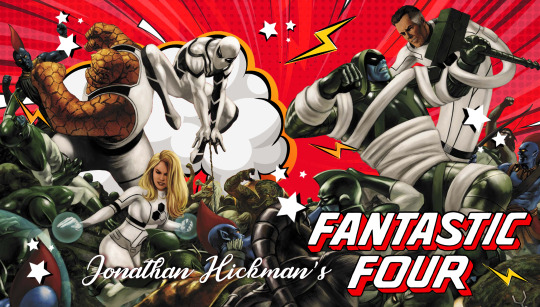
Jonathan Hickman’s Fantastic Four equals a ton of expectations. Capital E. After the original one by Lee and Kirby, this one is probably considered to be the most defining for the team. At least that’s what I kept hearing before picking it up. It’s a fan favorite, hence the E. So it doesn’t need any extra introductions.
Next — spoilers, questions, enlightening conclusions, and more reasons to despise Reed Richards...
When I couldn’t come up with anything to say about the previous Millar run, I thought that was because the run didn’t affect anything (seriously, you should see my review — it’s pretty much me going on and on about how Reed messed up again). Turns out, I was wrong. Not about Reed, about the run. It was just a prelude to Hickman’s cooking.
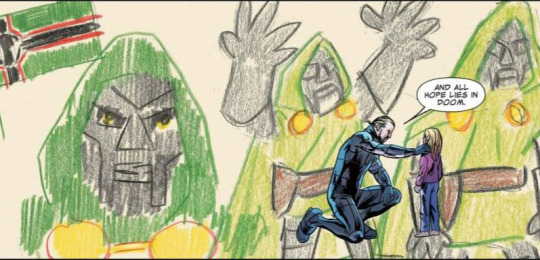
Almost everything makes a comeback: dead Galactus, living Galactus, Nu-Earth, Doom, Val’s brilliant mind, etc. Topped off with Hickman’s love for large-scale events, his style of storytelling (where time is a flat circle), and even text pages. Don’t worry though, they make an appearance but don’t take up half of the book (yet).
A lot is going on in this series. When I say a lot, I mean almost overwhelmingly. Hickman’s style is throwing bits and pieces at you at random points and making them come together at another point. Now when’s that gonna be — you never know. This makes his runs fun and just a little chaotic, kind of like life. And if you pay attention, the bits come together like a puzzle where everything fits and nothing is left to chance.
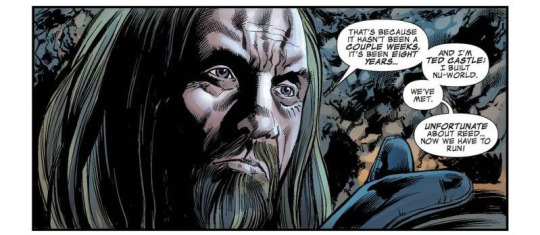
The narrative also happens in two books: at some point he introduces FF as in Future Foundation, thus solving the question that plagues many a writer — what to do with the kids.
As much as I don’t care for kids' adventures, these worked just fine, so I don’t even feel the need to defend their existence or convince anyone not to skip them.
Too many Reeds
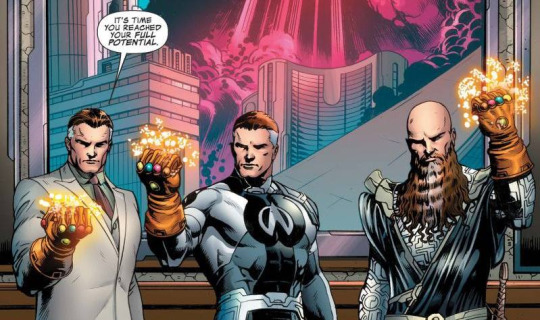
There is a whole council of Reeds and we learn that despite being so obviously the worst of all humans on Earth, our 616 Reed somehow turns out to be the best Reed out of all Reeds. Imagine how low the bar is…. Oh wait, there’s no need to imagine if you check out the story of Reed-98570 (Fantastic Four #605). And that creep is one of the founders of the council.
So between the nazi scientist Reed who stole Doom’s brain, other Reeds who turned their back on their families, and Reed Reed who is just garbage, there’s really only one question: why are all Reeds so awful?
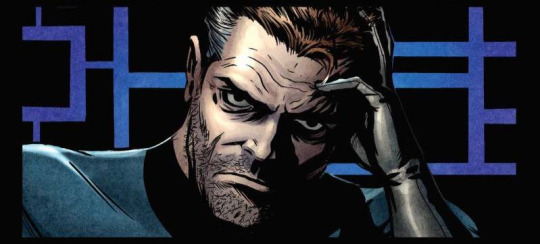
Hickman proposes a possible answer — his father wasn’t around. Kind of sounds like bs. Look at the Marvel Universe: how many heroes still have their parents? And some parents had been awful. Not everyone turned out like this (except maybe Stark…). No, I say, Reed is bad because of Reed. And Val is probably gonna turn out just as bad.
There is so much to choose from. At this point, the list of his misdeeds (as I just mean Reed 616) exceeds the list of Daredevil’s dead exes.
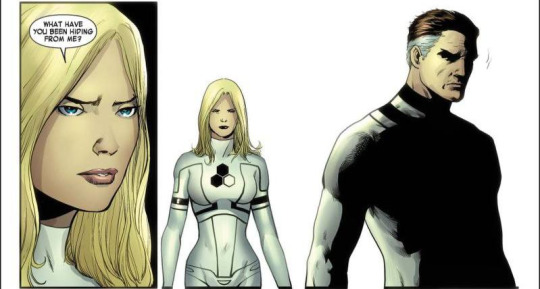
It doesn’t take Reed 10 pages of the new run to start lying to his wife.
But that’s not news. What blows my mind, is how obsessively Reed is trying to prove to Wizard that he’s going to raise his clone into someone better. Pffft, Reed. Take care of your own kids – they’re out of hand. One is making deals with your arch-enemy, and the other is doing god knows what in the middle of the night in his own universe. You have your hands full.
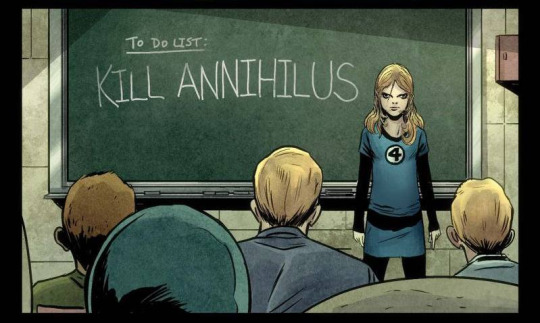
And that is not even remotely close to being all that Reed’s been up to. He starts Future Foundation as a way to bring young forward-thinking kid geniuses together and solve everything. Ambitious and fair, fair because he sees how the existing scientific community has stagnated. The old, experienced scientists have no interest in building a future they won’t get to see. But kids, they do. Val is a perfect fit for this foundation (and so is Bentley-the-Wizard’s-clone) and that’s a great excuse to start neglecting Franklin. You know, build a little competition. If Odin’s guide to healthy parenting has taught us anything, it’s that kids should fight for their parents’ love and approval... Fine, I’m exaggerating but just a little. After all, Reed manages to neglect FF too. Whenever he does, he usually dumps it all on Johnny.
Johnny’s reign
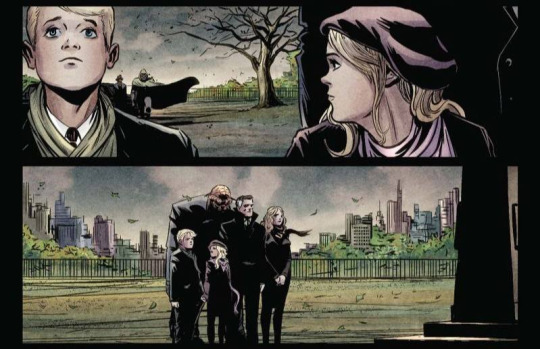
It’s on one of such days that Johnny ends up locked forever in the Negative Zone. He is presumed dead and it’s all very tragic for the next few months. But it does bring Spider-Man out of his neighborhood and into the family drama. He actually fits in quite well, with nothing to prove and his easygoing attitude (but even he wonders if Sue is fine with whatever Reed’s doing at a given moment). Still, it’s not about him, so none of his personal tales make it into the book. Of course, Johnny soon returns.
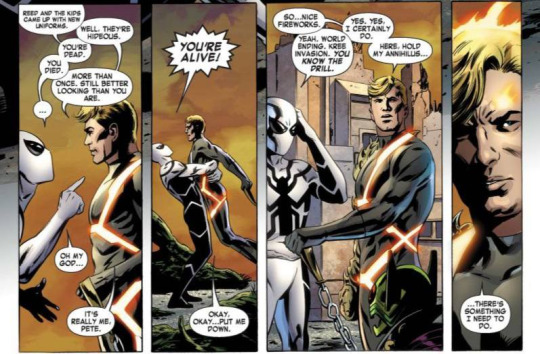
Not only he shows up at the best possible moment, he has Annihilus on a leash and complete control of the Zone (which gives us the ‘hold my Annihilus’ panel). I swear, whenever Johnny sends his ships and troops somewhere, you can feel Reed’s green envy. Reed probably thought he deserved it more… (I don’t have any proof but it seems like something Reed would experience.)
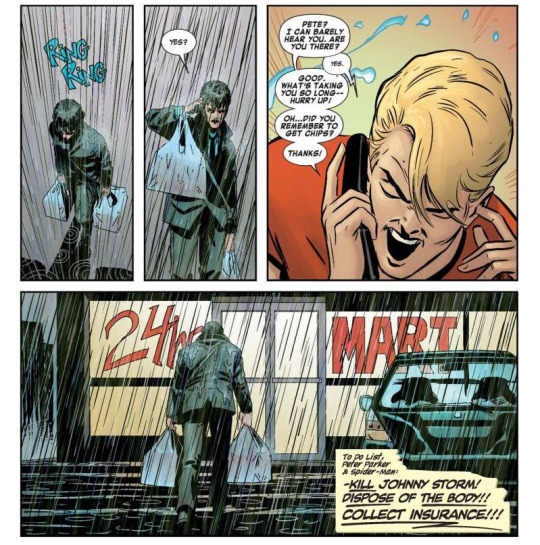
Johnny seemingly matures, he’s supposed to be 2 years older now too, but that doesn’t last long and he quickly reverts to his classic irritating self. As if dying and coming back doesn’t mess with one’s mind.
What’s worse, he gives the Zone free elections, and guess what? They vote for Annihilus. Again. They got rid of him with pain, sweat, and blood, and they voted him back in. Now that’s just unrealistic! Can’t happen. Right?
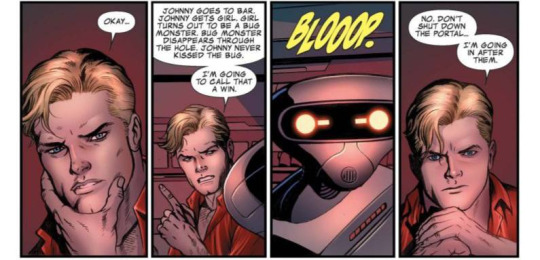
That’s probably everything of note that happens with Johnny. I have to assume that writers, for the most part, still don’t know what exactly to make of him. But my guess is his image needs a serious makeover. I don’t know where he’s at right now, but I don’t think this party-hard, drink-’till-sunrise, never-be-on-time, have-no-purpose persona should live past 2012.
Sue’s enchantment under the sea

How did Johnny even end up on the other side of the gate to the Zone? Well, Ben was human, Reed was busy with Nu World and Galactus, and Sue… oh, Sue was ruling the seas.
No, unfortunately, she still hasn’t left Reed for Namor or any other fish person. But she did spend a ton of time negotiating a truce between Namor’s kingdom and other fish in the sea. Even punched Namor, which only made him want her more.
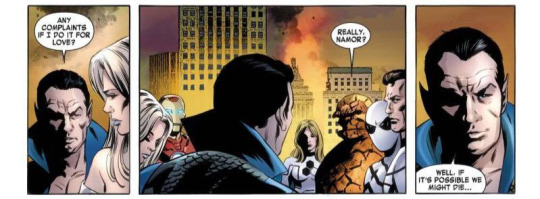
And I know that’s a whole other book but there was a jealous vibe from Emma, who also makes an appearance, and I don’t know what to make of it. From all we know, she can still have him as a backup if she wants to. Maybe she just hates being a second choice and Sue doesn’t exactly have Jean’s habit of dying and vacating the partner.
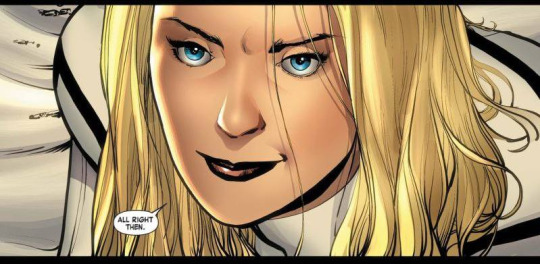
Other than that, Sue waters flowers, kicks celestial ass, and wonders if she’s a good parent. She is (her husband isn’t). She has confidence which is very nice to see. But she still doesn’t give Reed the grief he deserves. He keeps lying to Sue and deceiving her, which leads to bigger and bigger problems and she, along with other heroes, ends up having to deal with it. It’s a vicious circle and it’s an exhaustingly old issue even at that point (2011-12, people, the Avengers just came out!) Don’t get me wrong, I would be complaining if their married life was all suns and rainbows, because that’s just boring. But I need to see her confronting Reed. At this point, she just looks the other way and leaves him to his devices. I’m almost not surprised she jumped at the chance to hang out with Namor, even though he once again showed his more obnoxious side. At least he isn’t spending time with a bunch of himselves instead of her.
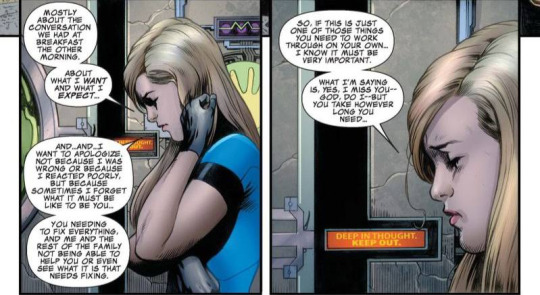
I never not feel bad for Sue, mostly because we still don’t really know her. Writers make small improvements and adjustments for her, and they reassure us that her love for Reed is real, but I can’t believe that. She has nothing of her own, nothing that isn’t attached to her husband, kids, the team, or Namor. She makes sandwiches and cuts off the crust.
The week of Ben
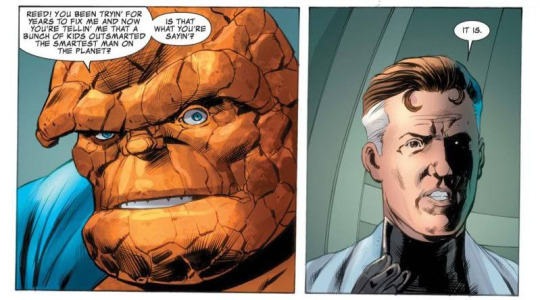
Now back to Johnny’s trip to the Negative Zone, where was Ben? Right beside him. Only Ben was human because the FF kids created a serum that could turn him human for a week every year. That was so shocking to everyone — the kids have figured out something Reed never could. Only that’s not true at all. Throughout the FF's history, Ben’s become human again at least 5 times, maybe more. Several times Reed figured out how to change him for good, some times he gave Ben the option to turn into The Thing at will. It never lasted but not all of that was Reed’s fault.
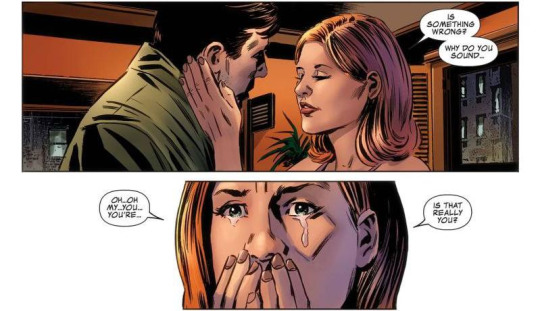
Regardless, Ben became human for his week, spent it hanging out with Johnny (worst choice ever if you ask me), but he also reunited with Alicia. The part that does bug me is he still thinks she loves him only for his looks. You know, as if his charming and not-at-all-angry personality is not enough. Also, no one is even mentioning Debbie who just a week ago was the love of Ben’s life and nearly became his wife and Sue’s best (only) friend in the process. But no sense in dwelling on the past.
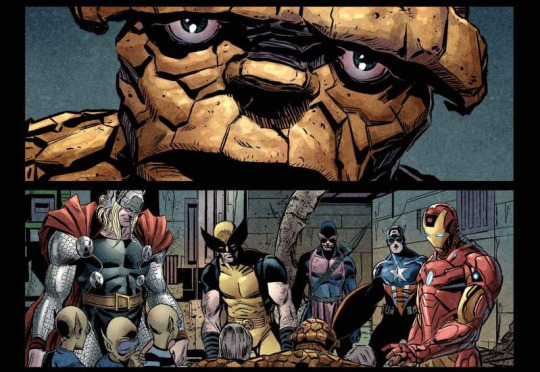
Of course, after failing to sacrifice himself instead of Johnny, Ben takes a guilt trip. No, he actually leaves the team to go mope around in the Avengers mansion. And feels that it’s really all he does during this run aside from backing up the team and announcing clobbering time. But we do take a little trip to the future with Reed’s father, and we see what the kids’ serum does to Ben – he only ages a week every year so he gets to outlive everyone and that’s when we get a little moment that reminds us that he and Reed are actually best friends. Something that’s been buried under Ben’s loyalty and resentment, plus occasional (permanent) selfishness on Reed’s side.
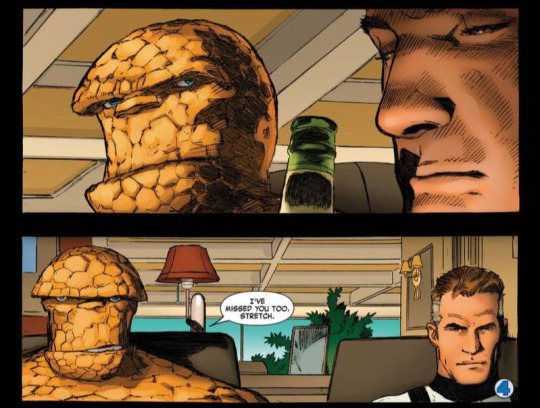
Moloids though, they worship Ben. So that’s something.
The kids won’t be all right
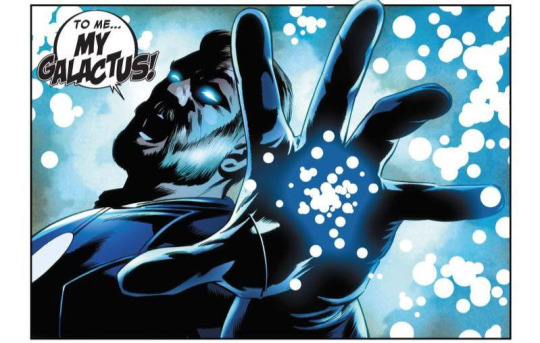
We get to see future versions of Franklin and Val. To call these kids shady is an understatement. They are straight-up nasty creeps. And in a very mutant tradition, they come back from the future to mess around with history. Franklin gives himself his powers back, Val constantly states how much she doesn’t like her kid self.

Meanwhile,, their younger selves, accompanied by the FF, constantly get into trouble. We do address kid Franklin’s issues that I felt were dropped by Millar, his budding envy for Val. And when it comes to Val, I don’t think she’s going to change. She is Doom’s child at heart… everything about her is Doom, her arrogance, her sinister ideas, her elaborate plans. She did get one thing from Reed though — lying. Sneaking around and doing shady things – that’s all Reed. It makes me curious, the more I read about her, the more I want to see her turn into a self-righteous villain. She has everything for the part and she’d make a far more exciting villain than even Franklin with all his world-ending abilities. Val is also more suited to rule Latveria than Kristoff. Not trying to give Doom advice on how to run his land but… just something to think about.
What’s There to Do(om)?
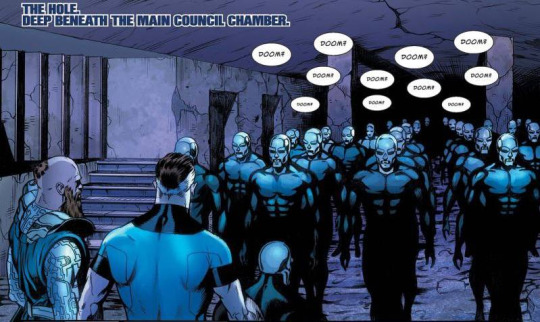
The Reeds have historically been very unkind to the Dooms. And before we get into it, remember that I’m not giving props to a dictator, but let’s agree that turning Dooms into talking plants or brain donors is certainly not the way to achieve your goals of universal peace and prosperity. But the council of Reeds hunts down every Doom in existence, which I don’t know if it does make our 616 Doom special. He keeps jumping higher and higher up in the power ranking, and at this point, it’s hard to imagine he could be defeated. With some help from Val, he even obtains an Infinity Gauntlet (from a different universe) and creates a whole world. That makes him a god and I know this Doomiurge will return in Battleworld.
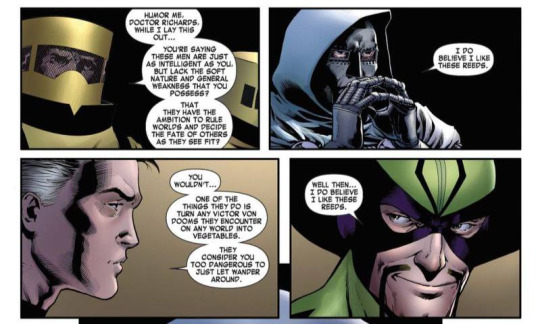
To make things worse (for Reed), through the course of the run, Doom is saving Richards and his family left and right. First, he saves Reed’s absent father (by killing his variant), then he sacrifices himself during the fight with the Celestials, and so much more in between. All while being very nice to Val and not breaking his word once. Oh yes, he’s a better parent to Val than Reed is.
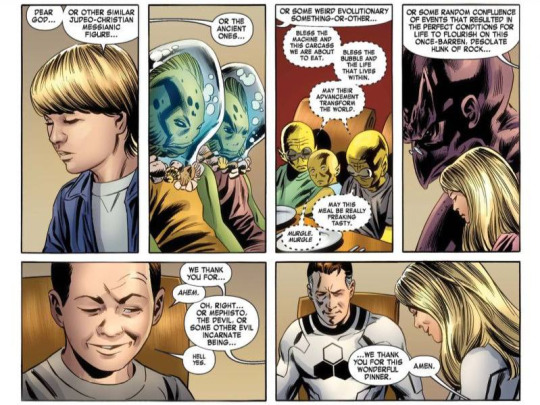
This is once again, a story about the family. Reed’s family, because even when they all deal with their own things, they can be sure that somehow Reed is going to screw up everything and bring about the end of the world.
All of it makes me understand one thing. When you’re writing a Fantastic Four run, you gotta be either pro-Reed or pro-Doom. If you’re pro-Reed, you’ll go out of your way to prove that Reed’s doing the right thing. Even when he does the wrong thing for the right reason, which is a - always, b- a clear sign of a villain.
Pro-Doom writers don’t argue with Doom being evil and ambitious, but they always try to remind us how honorable Doom is and that his heart may be black but there’s a soft blueish spot in it for Valeria. A bit of healthy disdain for Mr. Fantastic usually correlates with at least some Doom apologism.
#marvel#marvel comics#comics#comic books#marvel universe#long reads#comics reviews#fantastic four#reed richards#susan storm#johnny storm#ben grimm#spider man#dr. doom
18 notes
·
View notes
Text
CIVIL WAR

In a couple years Civil War turns 20. It's an event that almost everyone knows at this point, it's been adapted for the MCU, and it's one of the most iconic Earth-616 events.
A tale of exchanging freedoms for safety, hugely inspired by the aftermath of 9/11. That was almost 20 years ago, yet we keep circling back to the issue of government control. Is it a friend or a foe and if a law is wrong, how do we go about changing it?
When the time came to go through the CW issues of the Fantastic Four, I decided to go back and review the whole event.
And if you're about to move on, because you haven't read it yet (there are gonna be spoilers), or just bookmarking it for another time, I’ll leave you with my final thought right away: it's a very different experience for a teenager and an adult. For someone who is still sampling the real world and someone who's nearly fed up with it.

The idea to register superheroes wasn't new for Earth-616. In a different version, this bill’s been around since Byrne’s FF (unfortunately, I can’t pinpoint the issue but I referenced it in one of the previous FF reviews). What I do distinctly remember is the hearing, the team went to, and how passionately they tried to stall it.
Even then though, they knew it would come back to bite their backsides.
The bill reemerges after M-Day and blooms after the tragedy in Stamford when New Warriors trigger a team of villains while shooting their reality show (talk about your ‘00s essence). Supervillain Nitro uses his ultimate and disintegrates 600 townies, a bunch of heroes, and his own crew.
The public outcry is insane. There is high demand for masked heads on spikes, full transparency, and maybe some ritual sacrifice (just enough to butter everyone up). The sales of red paint and placards skyrocket, and everyone (knowingly or not) quickly picks their side of the argument.
Remember just a few years ago Genosha happened? Millions of mutants were brutally killed, and all it provoked was more hate toward them. What do they call it now, the good old days?
What's the plan?

The grand idea is cooked up by the great minds of Tony Stark and Reed Richards (eww). They go as far as to introduce 100 ideas of how to make sure Stamford never happens again.
The gist of it all is to register all superhumans, send them to training, then license them and release back into the world. Better yet, pack them in teams and send to each one of the 50 states. It’s superhuman police meets mutant registration and unites in a beautiful concept of a police state.
There are a few concerns with the plan, right off the bat.
Yes, the first one is data safety. Reed and Tony are smart for sure but for each of them, there is an equally inventive hero or a villain. There are no unbreakable/unhackable data storages. There probably never will be, so all the personal information heroes share will eventually be up for grabs. They guarantee that everything will be locked and hidden away in a digital Fort Knox, meaning they are promising something impossible. They’re setting y’all up.
They did cover their asses here though. What’s the best way to prevent villains from doing villainy things? Rehabilitate them, of course.
Though it does sound impressive on paper, it's in fact more of a suicide squad scenario. The villains don’t go through any sort of therapy and no one is offering them help. They are controlled and forced to do Stark’s and S.H.I.E.L.D’s bidding.
Some 20 years later Daredevil will ponder a more reasonable prison reform while chilling in his cell. But that wasn’t a common conversation in 2006. Back then we were way more into punishing everyone.
Stark doesn't hesitate to abuse his newfound power when, through his nanobots, he controls Green Goblin and makes him shoot an Atlantean official.
All part of the grand design.

And oh, of course, there is 42, the superhuman prison in the Negative Zone. The pride and joy of Reed Richards – a place where he and Tony eagerly send their former friends to take a time out and think long and hard about what they did. See, neither one of them goes for conversation, they jump head-first into policing.

Kids with superpowers have to go to military school now. That’s the kids who don’t end up as lab rats for an insane doctor. There is always one of those around and they’re somehow always in cahoots with the officials.
But chances are you, young superhero wannabe, are gonna go through military training (obviously the best kinda training if you want to help people, amiright?)
Jumping ahead, we get a nasty preview of one such facility. And guess who's in charge of the program? If the name Gyrich is familiar to you, need I say more?
It ends in tragedy too. Right away.
But enough criticizing. If you can’t say anything nice, don’t say anything at all.
Instead, let's imagine that everything works out. There are superhuman peacekeepers all across the US. And there are military schools where kids are screamed at by some YesSirThankYouSir.
Does that make Earth-616 any safer?
What happens when Sentry flies off the handle and destroys half of New York? Would it help that you know his civil name?
How about when Daredevil builds his Shadowland and chills there with a bunch of ninjas? Would you sleep better knowing his home address?
The short answer is no.
Then why do they do it?

My theory is there’s a reason one side includes Reed, Hank, and Tony. They are virtually the same archetype. All extremely privileged people, rich, famous, adored. They are also scientists – they operate in numbers and technologies, in fixing things. They think they know, which allows them to remain on cordial terms with empathy.
Looking into the future and using logic to solve the world’s greatest mysteries is the way all three of them choose.
Ok that might really just be Reed but what can I do, I hate the guy.
Either way, Reed and Stark both did some math and some thinking and figured that if you can't beat them you might as well lead them. That's why they both jumped at the chance to make the world better (Reed event dragged his family along for the ride).
It feels like halfway through the war though, the whole for Tony turned into an obsession with winning. Winning by all means necessary and realizing that the ends absolutely justified the means.
As it always happens, heroes on Stark’s side let themselves go way too far. If unmasking Spider-Man felt uncomfortable (we’ll get to Spidey), then building 42 with extremely harsh conditions just to scare everyone into registering was a full-on dictator move. Building a Robo-Thor (Ragnorak) to balance the power scales was simply outrageous. I told you, Reed, Pym, and Stark have serious issues with empathy.
Then, they created their first victim – Goliath. We could go into a long conversation about the issue of using a Black character as collateral, but we all know what’s what.
I remember from years ago the image of him lying in a giant grave. And only now it hit me that maybe it had to be him, to emphasize the metaphor of a giant loss. Because even his grave looks like a mass grave and the way he's laid to rest is similar. And this couldn't play out the same way with Stamford victims, because none of that was personal to the heroes.
You’d think one death of their own would stop them or at least force them to pause. But no, just a few people left the cause after that, among them Sue who unfortunately eventually reunites with Reed.
She did make a hole in his ceiling though. Good job.
But hey, Reed’s done the math. Can't go wrong with that.
I kept trying to put myself in Tony’s place to understand where he was coming from. And here’s what I figured.

There was a voice of “conscience” whispering in Stark’s ear – Miriam Sharpe (a parent of one of the Stamford victims. I couldn't not include the worst 'argument' in history that aged worse than anyone could imagine). There was Happy on life support after having been attacked by a supervillain. And decades upon decades of trying to keep it together as a hero and a person. It was easy to dismiss all that after time had erased most of the details from my memory, but that’s exactly what re-reads are for. He truly believed that something should be done so that even heroes could have it a little easier.
As a self-appointed leader of the superhuman community, Tony felt responsible for all of them and it was necessary for him to fix everything. This is where his ego plays a huge part because he took it personally and let it cloud his judgment. That’s a human thing but that’s also the thing he allows himself but not other heroes.

You know what? I'm gonna do something wild here. I’m gonna compare the two heads of the police state and make Reed look good.
He’s not doing it for power or his ego, he actually doesn’t let emotions play a part. We see that clearly when he continues to work with Stark after Sue leaves him. He puts his pain aside and does what he believes is correct (not right, correct). He's also doing it for the future and his kids and while that can be perceived as emotion, he also backs it by his math.
Meanwhile, Tony sees himself as the savior, takes control of all the capes, and you can actually see him basking in glory when he reports his victory to Miriam.
Who's fault was Stamford?
Let's roll back a little, to Stamford and the incident.
A huge part of the conversation revolves around who is responsible for the accident. We have the New Warriors, who poked the bear, and we have Nitro, who was the bear. The people though, they unanimously choose the only surviving New Warrior (Speedball) to be the scapegoat. Nitro is dealt with in private by Wolverine and Atlanteans (he offed Namora), who seem to be the only ones interested in bringing him to justice.

Throughout the Front Line series, Robbie Baldwin (same ole’ Speedball) is trying to come to terms with his being the most hated person in America. His parents turn their back on him, the government is offering him a registration (to which he opposes), and the people hate him and wanna see him hanged. Of course, Robbie does feel responsible, he is too. But Nitro is not a mine he stepped on. He’s a person, who did the actual killing.
Not at all surprising, that no one sides with Speedball. Not even his lawyer Jen, who’s trying to help for sure, but doesn’t seem to be hearing him. In fact, she’s more of a liaison between him and the authorities and the one vividly on the latter side.
Robbie succumbs to his guilt. Everyone sees him as a monster and a murderer, so he accepts it.
Here's the controversial part – I felt sympathy for him both times. He was reckless and untrained, which is the argument Tony Stark and others put on their flag and ran with. That is the idea – to train and register the heroes.
But for that to happen, Robbie had to be the scapegoat. And the superhero community might have been able to eventually forgive him but everyone else? No way.
In the process, he gets shot by one of the Stamford parents (they really aren't making themselves look good there) , and by the end, he accepts the deal under one condition – that the shooter gets released as well. Robbie walks free but where would he go? He ends up becoming Penance (Not Monet-Penance).
Which is probably not a great idea anyway, since he's beyond messed up at that point.
This is a tragic bit of the story.
It seems like nearly everyone hates Speedball, even more than they would Nitro. I mean, Nitro has a strong argument covering his radioactive butt — he’s a villain, what did you expect? A New Warrior is a hero, so he’s held to an impossible standard.
What can I say, those in power really did find someone to blame just so those in power could maintain their faces and a clean image. One person is always a very acceptable sacrifice for them.
Are you in or are you out?

I promised you we’d get back to Peter Parker. He is absolutely one of the main characters here. Fair to assume this story was essential for him at the time as well (yes, we’re not peeking ahead because we all know his identity can’t stay public forever).
Obviously, in my teens, I was wise and could see right through the trap Tony Stark was setting for Peter. Tying him to the cause by forcing him to be the first hero to unmask, promising him and his family protection, sharing only bits and pieces of truth? He’s practically spelling it out for Pete: “I own your webbed ass!”
Yeah. Times change. It’s so easy to steer an idealist. And that’s who Peter is, that’s who most heroes are. He still believes in the whole responsibility concept, and by saying “This is the responsible thing to do”, you can get him to do nearly anything. Top it with his admiration and infatuation with Stark, and you have a foolproof Spider-catcher.
Imagine your ideals being dangled before your eyes like that and tell me you won’t follow.
Here’s the deal. Whenever I ask people (be it regarding the movie or the comics) whether they would’ve registered or not, they almost invariably say no. Most of us are that convinced that our ideals are concrete, that there is no scenario that could shake us up and force us to the other side of the barricades.
Allow me to call BS.
So many of us really still view this as a fantasy arc: even if has something to do with reality, nothing like that can ever happen.
But fantasy simply takes reality and pushes it to extremes. Remove the capes, take away the superpowers, and take a closer look. It’s an ongoing leitmotif throughout history. Hell, it even happened in the same universe before (hello, Mutant Registration)!
So while the idea 20 years ago was to choose between safety for the majority and giving up just a portion of your freedom, in reality, most people always choose the latter.

Because when you are asked to do so, it’s never really a command, it’s a suggestion. And it’s always coated with a reasonable explanation that benefits you. These things are never a one-day operation. They are carefully prepared for us by propaganda and advertising which even work on several levels. If the simple explanation doesn’t work on you, the complex one might. Either way, you’ll be on board.
You get to choose between easy and difficult. And you only know what you will decide when you come face to face with the problem.
That’s why my answer then was “I’d never register” and my answer now is “I have no idea”.
The right side

It’s easier to choose freedom when Cap takes a firm stand for you. He can do no wrong in the eyes of other heroes (I mean, even Punisher refuses to hit him, that kinda cred has to stand for something). But siding with the squeaky-clean Cap is a pretty picture. We don’t get those in life.
Just like Tony, he feels responsible for every hero. I think, for one it’s a vanity thing, and for another, it’s the leader gene.
It never felt to me like Cap was fighting out of sheer stubbornness or even because he believed he was right (like Tony did). He fought because he believed this was the best course of action for the superpowered community. Heroes and villains alike. The old dying to protect your freedom to be wrong narrative.
He is a 616 icon, he has nothing to gain in all this…
…Which may be why he lost. He’d put up a great fight, but he never offered an alternative course of action.
If the registration bill had never passed, what was the other option, where was the guarantee that Stamford wouldn’t happen again? Essentially, this is why he gave himself up and stopped the fight. This is WHEN he did so. He saw the battle in New York as a step away from a mass disaster. So he took off his mask and accepted handcuffs.
Now did he betray everyone who followed him?
Yes and no.
Yes, because without him all they had was a ragtag team of heroes. Without Cap’s credibility or his resolve, they were completely lost.
And No, because if they couldn’t stand up and continue the fight, they may have been fighting not for something but alongside someone.
Cap giving up is not an example of an underwhelming resolution. It’s just what you do when the ends stop justifying the means. When the body count grows and you see no way out.
He chooses to stop getting people killed — something I don’t believe Tony would’ve done.
I remember being so impressed with Cap’s resolve when I was a teen. What I see now is a grand gesture that ultimately changes nothing. Then again, that’s what heroes do, right?

At the end of the day, they stand before you and invite you to make a choice. He wasn’t doing it for the other heroes, he was doing it for everyone else. Showing that a single person can be responsible and that’s what they should be trusting in. The fact that they managed to destroy a whole block in New York didn’t exactly give Cap’s side any sympathy points.
I also get why Stature and Nighthawk defected from the cause — they chose personal safety and comfort over constant risk.
I get why Ben Grimm left for France. Maybe just now but I get it. Not wanting to fight and to even pick a side. He may look like a coward through idealistic glasses (even though he does come back eventually). And he may be naively ignoring the fact that whenever he goes, the registration law might follow.
But he goes anyway and it’s hard to say he’s wrong. Sometimes you just want to escape because you know it’s gonna get ugly.
What was the point?

The resolution of this war doesn’t give you an answer who was right and who was wrong. That’s the point — there is no point. Never is. The main book went out of its way to draw similarities between Civil War and many famous battles throughout history. You are slightly pushed toward sympathizing with Cap’s side and I bet it hits you hard too when that side loses and later he gets shot.
After all is said and done, in a one-shot called Confession Tony Stark admits to Cap’s dead body that the war wasn’t worth it. An answer to something Cap asked him before when he first was arrested. Kinda hypocritical of Tony to not realize that after Goliath's death.
It’s not the end of the story but it’s the end of the war, and I think between the name of the comic arc, the events, and the final words, you can piece together a pretty good conclusion.
Cherry on top
I’m leaving the arc I found to be most memorable years ago for last.

It’s Front Line and specifically the arc of Sally Floyd and Ben Urich. They are both journalists, and they are hunting down the same story. The sides might be different, but the sources, the issue, the story — the story is the same.
By the end, they’re sitting on this goldmine of an article. Something they have the responsibility to share as professionals who claim to value integrity. But they bury it, because their personal experience during this war gets in the way.
This part of the book really surprised me as a kid. I loved the fact that we took the time off to see how the real people are dealing with a superhero conflict. And we know that Ben isn’t exactly impartial, he has a long history with every New York hero ever and works for everyone’s favorite Daily Mail substitute — Daily Bugle (where JJJ is on cloud 9 because the damn capes finally get to answer for their misdeeds).
Sally and Ben find out exactly how Stark orchestrated the fallout from Stamford and how at every turn, he steered the narrative in his own chosen direction.
They bury it. And I don’t know how to feel about that now. It’s a selfish and selfless choice. This could’ve made them legends but this also would’ve destroyed any control the heroes had over their fates.
What’s it good for

I used to think this was a book about right and wrong, and I used to think the sides were very obvious. But I was idealistic. While I still believe that this was no way to go, and othering anyone is an awful idea, I get to look at this as a selection of personal stories now. And I can easily see myself (or anyone really) in every one of the roles.
So maybe it’s more about the choices you end up making (I mean, it does continuously ask you whose side are you on). Or maybe, in another decade I will read it again and see an entirely different tale.
P.S. I tried to make it simple this time by using the Marvel Unlimited reading guide, but you should know that it’s slightly out of order and incomplete.
#marvel#marvel comics#comics#comic books#marvel universe#long reads#comics reviews#civil war#marvel civil war#spider man#iron man#captain america
16 notes
·
View notes
Text
The Tragedy of Robin(s)
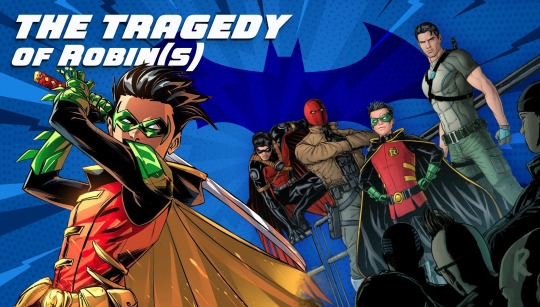
After catching up on the most recent Batman stories, especially Batman vs Robin by Mark Waid and Knight Terrors by Joshua Williamson, I’m seriously rethinking my whole impression of Damian Wayne. Not a secret, I’d always considered him to be a little annoying gremlin who desperately needed both affection and a serious talking-to from his parents. He also lost the parent lottery, having to be sired by the two people least capable of either.
This whole text is pretty much my opinion based on what I’ve read so far and I haven’t by any means read everything, so feel free to disagree, but remain polite about it.
Mommy issues
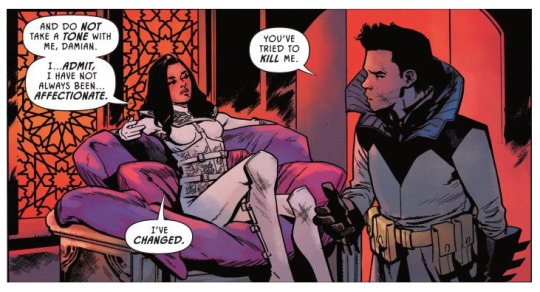
Yes, under all of Damian’s bravado, there is an unloved child. Because it’s really easy to forget that he is just a child, despite his neverending threatening to kick everybody’s ass and often succeeding in that.
Talia is arguably worse than Bruce. From an early age, Damian was forced to prove himself because of some made-up empire he was probably going to inherit if his mommy dearest chose one day to give up the reigns. That and showing up occasionally to remind him that he’s not good enough is all Damian is getting from her.
That also explains the kid’s obsessive desire to inherit Batman’s cape and cowl. In Batman vs Robin, that desire gets exploited by the forces of darkness, turning the kid’s dreams into actions. Something that conscious Damian is trying to fight.
But we aren’t here to criticize Talia’s parenting failures (she sucks), we are here to criticize Bruce’s parental failures.
Daddy issues
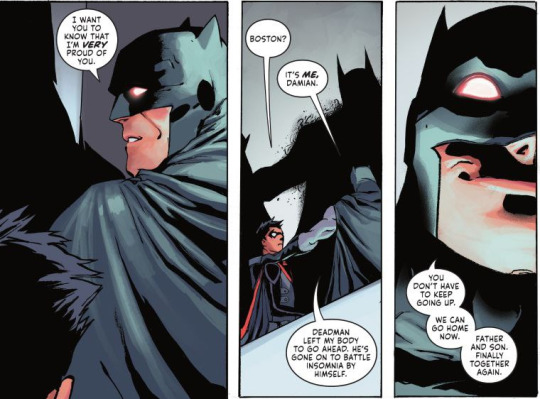
From day one Bruce had no idea how to relate to his son. I’d say it wasn’t the shock of even having a biological son, as much as his incapability to care about someone more than he cares about his mission. That’s his horrific self-programming that his kids (all his kids) are fighting through. Some are more successful like Dick. And thanks to Tom Taylor for reminding us of that with every issue of his Nightwing run. But Dick actually had a loving family, so when Bruce took him in, he already had the fundamental understanding of being a good person. That’s at least partially why eventually he manages to build healthy relationships with people, even with Damian.
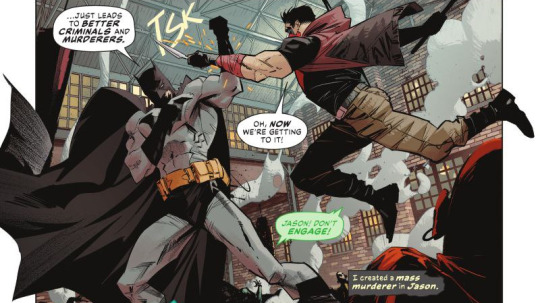
Jason is more of an example of what happens after Bruce’s parenting. Bruce still can’t decide whether he was a mistake and he just trained him to be a good murderer. I’ll make it easy for him - yes, the mistake was on you, Bruce. No, it wasn’t the fact that you trained him.
But seriously, after three attempts Bruce still has no idea how to talk to a kid.
Alfred did, and that helped Bruce’s older sons, then Dick and Alfred did what they could for Damian. Because let’s face it, after Alfred’s death, the closest thing to a parent Damian has is Dick Grayson, and he lives all the way in Blüdhaven (which is still closer than Alfred).
Not a bat situation
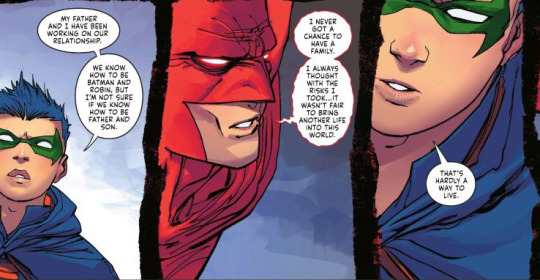
I’ve come to the conclusion that Batman knows how to communicate with Robin, so on this level his relationship with Damian seemingly works. But Bruce can’t build a normal healthy one with his son. And that sentiment was verbalized by Damian himself during the Knight Terrors event. The kid understands it, while Bruce himself does not, therein lies the tragedy.
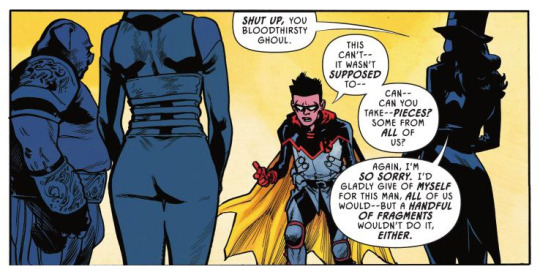
It’s even worse when you see the numerous times Damian had supported his father as if looking for his approval. Again, he might claim he doesn’t need it, he does (thanks, Talia).
That’s a pattern
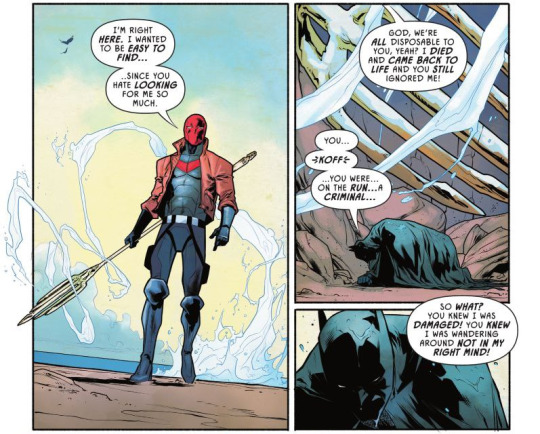
Batman has a serious problem with people. Batman vs Robin was a pretty clear reflection of that, especially when Bats confronted all of his former Robins (and four of his sons). His regrets regarding all of them were not without reason and it becomes clear later that all of his kids hold some resentment against him (especially Jason).
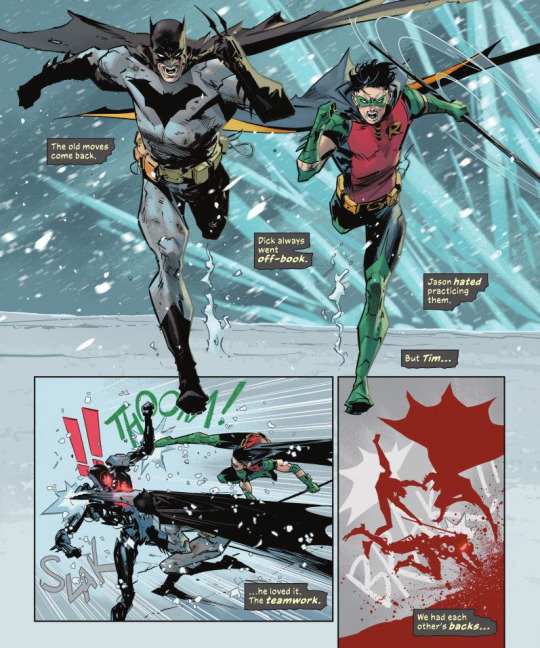
The way I see it, his favorite Robin is Tim (he makes it clear during Failsafe and the Bat-Man of Gotham) his favorite son is Dick (he was the one who managed to heal and not constantly bug Bruce about what he'd done wrong). Unfortunately for Damian, their existence will always make him feel competitive.
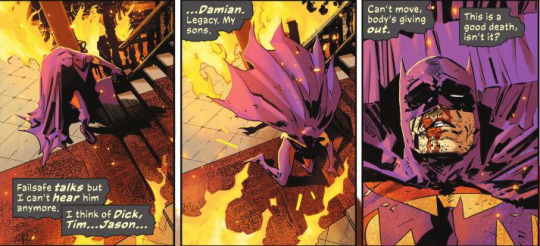
Once again, that’s fully on Bruce. Not on Batman, because I think that Damian can handle not being ready to replace Batman, but on Bruce, because he doesn’t feel the love. I’m not saying Bruce doesn’t love him, but if he does, it’s in his own way and he’s not communicating it well. He always pawns Damian off on more affectionate people.
What is love
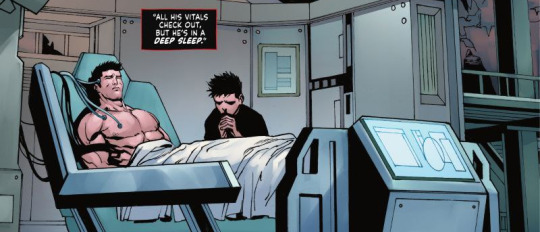
Meanwhile, Damian truly loves his father. Enough to run around following him, sit at his bedside while he’s taking a really long nap, enough to side with him over the rest of the family (I’m still in the middle of Gotham War). That’s what children do when they want their parents’ love and attention, they try to be perfect.

All of that makes me feel so so bad for Damian. I actually don’t hate him, even if I like to jokingly say that I do when he starts acting like a brat. But he deserves unconditional love and neither one of his parents chooses to understand that.
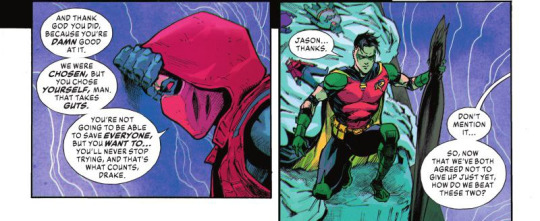
For his sake, I hope he grows up and manages to grow and move past this (probably with the help of his family like Jason and Tim did during Knight Terrors). And when he’s old enough and wise enough to make his own decisions, I hope he sticks Bruce and Talia in a nasty old folks’ home.
#comics#dc#dc comics#dc characters#batfam#batman#robin#damian wayne#jason todd#dick grayson#tim drake#bruce wayne#nightwing#red hood#red robin
25 notes
·
View notes
Text
Mark Waid’s Fantastic Four

It’s rare that a writer perfectly fits the character but when it’s Mark Waid and Fantastic Four, this is exactly the case. This was the first time when I was genuinely excited to read every new issue, and this is the book that’s finally made me like the characters. Well, not too much because Reed is still there (ugh). But you know what I mean.
Anyway, if you haven’t read it, I very much recommend that, and if you have and want to relive it, go ahead and read the rest!
The new look

Waid’s run starts with a meta-story that quickly points out what we’d been getting wrong all these years about the Fantastic Four. They were never superheroes, they were adventurers. And suddenly, right there everything falls into place. ‘A group of adventurers’ becomes the leitmotif of the whole run. In a way, this definition is a culmination of everything that came before – journeys through space, time, and the Negative zone, occasionally interspersed with supervillain encounters. But this is also a way to refresh the book by letting us view it in a slightly altered manner. I’d say that’s something the book needed desperately.
It’s also immediately obvious how the book mixes the classic lighthearted tone with a more mature one. It’s ready to explore serious issues, which isn’t new for the FF, but it wants to keep things bright and colorful. That’s where Wieringo’s art works perfectly in unison with Waid’s stories. And such stories we get!
FF is for family

During Claremont’s run, I said that FF started to feel like a family. But everything before still had them as Reed, Ben, and two supporting characters. Even when each of them faced their own stories, and they confronted them together, they never felt like people who had known each other their whole lives. Waid gives them small interactions that remind you how close they all truly are. And it’s not just banter between Johnny and Ben, it’s the way Sue interacts with Reed, admiring his genius and mocking his poor social skills and the way they both interact with their children. The children, by the way, they play a role too. They are very delicately written into the stories, even becoming their center, but never serving as a plot device. I’m gonna go back and talk a little more about Franklin later.
Waid allows the characters to interact effortlessly, and naturally, so they don’t feel like strangers.
Call for four
The main four people in this graphic play are of course Sue, Reed, Ben, and Johnny. Here, for the first time ever I can say that I got to know them all. It’s both ironic and sad that it took 41 years for them to finally be portrayed as people, who you kinda want to hang out with (even though you’ll always be an outsider because ‘family’)

I very much liked Susan here. She is shown as a genuinely happy woman, a strong hero, a great adventurer, a caring mother, and a wife. I’m not saying “good wife” because her not having left Reed years ago makes her either a legend or someone who needs serious saving. A legend if we go off this run. She still gets her jealousy moments that are not entirely justified. Sue gets jealous of Alyssa, obviously because Reed neglected to disclose the nature of their past relationship to Sue. But similarly, she goes as far as purchasing a statue of Namor to make Reed jealous. This isn’t how a healthy marriage works, Susan. And it makes me feel bad for Namor. His arrogant ass doesn’t deserve this.
But it’s great to see her happy and joking, and spending time with her family while still trying to raise her good-for-nothing brother.

Speaking of Johnny, Waid probably felt just like we all did - Johnny hadn’t gone through much growth before that. Yes he’d been married, and he’d saved the world, but when it came to living in it, he wasn’t very well-adjusted. Waid changed that by putting him in charge of the FF company (say it with me: nepotism!). Not just that, but we got to see Johnny navigate the business world, and face pretty unfortunate obstacles. I have to say, I felt real bad for him when Sue went off and blamed him for the stolen sample of unstable molecules. But it all worked out in the end. This is how this run started, by reassuring you that the FF has everything under control.
We’ll get to Reed (ugh!) and everything that went wrong later.
Back to Johnny though, he has a tough time losing popularity, he even seeks the help of Spidey to learn how to be unpopular with the masses. It leads to a funny arc that honestly, leads me to believe that Johnny’s success with women is just it - his fame as a superhero because he has zero game otherwise.

Again, not a secret - I never liked the lovable blue-eyed Thing. He’d been quite whiny and manipulative, and from everything I’d seen so far, it was really hard for me to relate to his issues. Waid changes that too, he lets us see why the others like and appreciate Ben, which is not because of him continuously reminding them that he’s lovable, and certainly not for his textbook heroic actions that again, to me often came off as ingenuine.

He has a sense of humor here, when he bashes good-for-nothing Johnny, his jokes really stick the landing. When he connects to Franklin, he is being 100% transparent and helpful. In fact, I think he’s one of the characters that have the truest understanding of what the kid is going through, and he doesn’t waste a second in telling him that. He is also ready to sacrifice himself and not make it a big theatrical act. And after building up that side of his character, when he dies in Latveria, it… well, it doesn’t stick, this is still comics, but it certainly affects you as much as it does his family. Waid doesn’t let us sit with this emotion but he doesn’t rush through it, showing exactly how deeply it had touched everyone. Especially probably Johnny, who conjured an imaginary version of his friend. And here, Wieringo comes back after a short break and delivers a stunning difference between Johnny’s daydreaming and real life.

I already mentioned that Franklin stops being a prop and becomes a character. Waid makes him face the good old older child problem - sibling rivalry. When all attention immediately goes to baby Valeria, Franklin misses his quality time with his parents, especially his dad. And that gets you to see him as a little human who is going through his own set of issues. That becomes even more obvious when he is sent to hell by Doom and is traumatized by the event so much, he can’t speak. Waid showed us the toll it took on Franklin’s psyche, and he did it through the adult characters around him, without trying to imagine how it would be, and without making the kid sound wise beyond his years.
Doom politics

I’m gonna get to Reed but first, we need to talk about Doom. Because if I had to pick, I’d say this is where you can truly see the nature and the cause of the Reed-Doom war. First of all, different writers view Doom differently, and while some attempt to justify and redeem him, others go out of their way to remind you how evil he is. Waid is not a Doom apologist. He immediately shows us how ruthless he can be when he kills the real Valeria to gain mystical power and then shows us that the prosperity in Latveria is a smoke screen that’s hiding a small guillotine-equipped human disposal system. So after all the debate, Doom is still a dictator who disappears his critics to silence them and forces people to trade freedom for stability.

Waid also does to Doom the same thing he does to Lex Luthor in Superman: Birthright. Now they both lose potential friends over a misunderstanding. Only in Doom’s case, he thought Reed had messed with the controls on his machine, which ultimately resulted in him hiding behind a mask. It’s not his arrogance now, but the jealousy he thought Reed felt toward him, that drives Doom.
This time though, In his evil endeavors, Doom goes further than ever before: he uses baby Valeria to get to the FF, then imprisons Franklin in hell, and tortures the rest of them. He likes Valeria though, that’s kinda sweet.
Needless to say, when the team finally defeats Doom, and even temporarily sends him to hell (but not before he disfigures Reed’s face).
Reed (Ugh!)

Here’s the thing, this run didn’t make me like Reed any more than before. Sure, he gets his redeeming qualities, plenty of them in fact, but he keeps messing up big. He even gets mixed up in international politics, which I gotta say was written very well. As soon as Doom disappears, multiple countries (including neighbors like Hungary and Serbia, as well as the US, Russia, and China) are preparing to make a move on Latveria. Meanwhile, in an attempt to deDoomify Latveria, Reed moves his whole family there and takes over the country. That’s a terrible decision on his side, and one that he’s tried to pull off before. My question is, when is Reed Richards going to realize that he’s not a politician or a monarch and stop trying to enforce his vision upon everyone?

Essentially, there isn’t much difference between what he and Doom are doing. They are both consumed by their own vengeance, and both believe they are making peoples’ lives better out of the goodness of their hearts. Either way, it’s the Latverians who end up suffering. Reed didn’t even make any kind of address to them, before raising his shirt as a flag above Castle Doom and pretending everyone was now free. He needlessly endangered them to prove the FF wasn’t there to hurt them and then invited everyone to loot the castle. Happy 1917, I suppose?
The visuals in this arc are a little darker. I don’t know the process behind the decision, but this is where we temporarily say goodbye to the larger-than-life bright art of Wieringo and say hello to Howard Porter’s more realistic approach. He especially focuses on Reed’s Two-Face appearance, highlighting the more fitting side for each one of his statements.

Just like the first time around, Reed can’t seem to take over Latveria without a shadow of Doom looming over him. The first time, he was possessed by the armor, the second, however, it was all Reed, only with a physical scar left by Doom. Everyone else (except for Franklin who was in hell, after all) shook it off. But Reed didn’t. He was hell-bent on destroying everything Doom had and built just to make sure he would never return. Ultimately, it led to him imprisoning Doom (and causing his escape because when does it ever work out?)
He also shoots (and kills) Doom-possessed Ben to save Johnny.
Yeah if anyone was hoping this run would make me like Reed, they were wrong.
Reed reminds me of Buffy. Everything does but hear me out: as the leader of the FF he drags them into wild adventures and some of them inevitably end in disaster. Then it takes writer magic to make everything work out and pretend that all the issues and idiosyncrasies don’t really matter. But they do, everything he’d done up to the end, everything he said be it in service of a bigger goal or not, still matters. He keeps making mistakes that go unnoticed when he comes out on top.
As a reader, you can like the team and hate the person. And this run has absolutely made me like the team.
Bag of tricks

Waid utilizes so many narrative tricks like the team meeting the Kirby-god to restore the status quo. Once again, ironic meta-stories allow to push the story forward.
Another trick was kicking the FF out of their comfort zone of being rich and popular. And that is a great callback to the first issue, in which Reed confesses to Valeria that he worked relentlessly to make sure the FF is popular and beloved to compensate for the cosmic rays incident. Because… imagine them having to live like mutants (and blame Reed for that).

Waid forces Reed to come face to face with the one thing he can’t understand - magic.
The dysfunctional Frightful Four’s family dynamics are juxtaposed with those of the original FF, and we see why one works while another keeps failing.
As the herald of Galactus, Johnny encounters a world of sentient ants, making us look back at the first FF-Galactus encounter.
Then the team meets the person behind Galactus, someone who in all honesty, is nothing more than an unimpressed hater. So… nothing shocking about him going around eating worlds after all.
And there is a moment when the team loses powers only to get them back because they can’t imagine being without them now.
All that draws these characters, lets you see them for who they are, good and bad, and leaves you wanting more.
Final thoughts

Waid’s run is enjoyable in every possible way. It’s very 00s in terms of visuals - cartoonish and bright, with just the right amount of nostalgia especially if that’s your introduction to the comics era. Narratively, it turned out to be deeper than I expected, all the while maintaining that connection to the original Lee/Kirby era. I’ve noticed that this is a trend with Waid’s books, he tries to at least partially return the characters to their starting point, make them recognizable, and rediscover their roots. For the Fantastic Four, it works incredibly well.

If we ever get a Disney Fantastic Four cartoon, I would like it to be based on this run since it’s done a marvelous job of flashing out each person behind the uniform.
#marvel#marvel comics#comics#comic books#marvel universe#long reads#comics reviews#fantastic four#reed richards#susan storm#johnny storm#ben grimm#victor von doom
16 notes
·
View notes
Text
Fantastic Four by John Byrne

This run is considered to be one of the must-reads, so well, I read it. And the whole thing left a weird aftertaste. Very similar to the one you have after learning more about its creator. Yes, one could be a good artist and a decent writer without being a good human.
But we’re here to focus on content, not the creator, and that’s what I’m going to do.
What it feels like

I jumped into this run right after Lee/Kirby, skipping most of the stuff in the middle. So it was a new take on the team right off the bat. Byrne focuses on the human sides of the FF a little more than the original run does. The structure of the stories also changes from a day at the Baxter Building -> a villain appears -> the villain is defeated. We start getting multiple chapters or issues in every arc, and it makes them more complex.
In fact, complexity is certainly something that appears and grows from the 1970s to the 1980s. That’s true for most comics.
But then there is the how it’s done and the what is done. And while one is a huge leap forward, the other is very controversial. I couldn’t find any explanations for some of the storylines aside from the idea hat (you know, when you get a hat, throw random ideas in it and start pulling.) Because of that, the stories seem disjointed. They connect to one another but it’s hard to say what exactly was the writer implying. Unfortunately, the more we know about the writer in question, the less chances we have left to misinterpret it into something more digestible.
It’s not like that (or it shouldn’t be)

Byrne leans into the white savior trope. Every time the characters encounter racism, it feels ingenuine. Especially when blond blue-eyed Johnny jumps in to save Wyatt. This same feeling I got from Roy Thomas’s apartheid issue (FF #119) and it doesn’t get better. Yeah, we can argue that this is the 80’s but that trope is in no hurry to disappear.
When it comes to political takes, Byrne’s are controversial, to say the least. I wrote a whole longread, complaining about the bizarre Latverian arc, in which the FF organized two coups in a row first bringing democracy to the people of the country, and then, handing it back to Doom. It’s all disguised into a lesser of two evils issue but it won’t sit well with anyone who’s familiar with autocratic regimes.
Barely moving forward

Byrne also shakes up the character dynamics. But was any of it for the better? At times, he presents a more acceptable version of Reed. He is still an easily hooked, eager scientist who can neglect his family in favor of his work. But he’s not an absolutely intolerable garbage human anymore. He is also the least interesting character of the bunch because aside from science and condescending explanations, he doesn’t have much going on. He becomes more observant though, even noticing the change in Johnny when he starts dating Alicia (and I later will circle back to that absolute eww moment.)

While all that is true, Reed is also shown to be racist against Skrulls during his trial. His statements are what any racist would say. Verbatim.
It almost feels like Byrne himself is interested less in Reed and more in other members of the team.
Women of Marvel

A lot of attention goes to Sue, Frankie Raye, and She-Hulk. And here I’d have to give Byrne some props. They are shown as competent and as strong (or potentially as strong) as their male counterparts. It’s suggested that Sue is actually the strongest member of the team, and it’s a very reasonable statement too. She stops being a quiet voice in the back and even reflects on that.
Unfortunately, I have to retract the props immediately because there is a weird violence kink that accompanies all the development. Like Alicia being badly beaten up by Annihilus, Sue being tortured by Mephisto, She-Hulk being photographed and then verbally assaulted by an editor. This is a repeated offense with Byrne's writing.

Then, of course, there is the arc with Sue’s miscarriage and the one with Malice. Now the first one might not rub everyone the right way, but I think it’s something that made the 80s comics relatable - human issues that heroes face. And in this case, it’s one that comes not as a result of her superhero life but of her being exposed to cosmic rays. She doesn’t immediately forget it either, this arc echoes through the following issues and while I don’t know whether the portrayal is at all genuine, it’s there and that’s quite innovative.
Go ask Malice

Malice is another Sue-centric concept, it’s her evil alter-ego that’s brought forth by a villain.
And here I have an issue because maybe instead of Psycho-Man - a hate-based villain (which was a mediocre concept all around) it could’ve been a manifestation of her grief and exhaustion with his behavior.
This could have (and should have been) an internal family matter for the FF with Sue confronting and possibly blaming Reed and Reed finally acknowledging how crappy he’s been and changing for the better.
Sure this doesn’t have the scale of the whole NYC in a hate-fueled frenzy but it does have just the right tone for a family. While we’re at it, Byrne doesn’t have the best track record with tackling racism or bigotry issues so again, that would’ve been much better.
Even if the concept itself was interesting, Byrne’s execution fumbled it completely. Sue’s hate is a twisted form of her love. And when it comes to Reed, Malice actually addressed all the reasonable points. He really has done every single thing she’d accused him of, and he proceeds to do them again. So really, he doesn’t learn anything from this whole ordeal.

It’s even worse that Sue attacks him later, again, with reasonable demands of revenge on Psycho-Man, and Reed tries to dismiss her to focus on ‘more important stuff.’
I’d say the right thing to do would be to allow She-Hulk to immediately side with Sue because that’s what any woman would do no questions asked. Ideally, Johnny should have done the same – he was raised by Sue after all. On the other side, his only male role models are Reed (ew no thanks) and Ben (ew no thanks.)
When they finally face the villain, Byrne goes back to his favorite tools - torturing Sue. The torture isn’t physical but Sue keeps seeing an exaggerated version of Reed who blames her for everything and treats her like garbage. Shockingly, he’s not that different from the real Reed.

I don’t have to be too negative here because, in the end, Sue does defeat the villain, punish him, and save Reed. She even changes her monicker to Invisible Woman (and that’s the name we know her by now). But again, some very odd decisions preceded that positive outcome.
This arc is pretty sad to read because psychological manipulation and violation of a person’s psyche is a big deal. This could have been a groundbreaking arc. But instead, it gets cringey at times and doesn’t do the characters justice.
...And others

Like I said, Sue isn’t the only lady who gets to stand in the spotlight. I quite liked the character of Frankie (before she fell in love with Galactus for like 3 panels). She has quite a story, having a power she couldn’t access and a phobia connected to said power. With a little more development (I’m talking modern-day standards) she could’ve been a way more compelling character. But ultimately everything worked out pretty well, especially after her over-eagerness to resolve everything with brute force paid off when she became the herald of Galactus.
She-Hulk is always a joy to encounter, and she takes over the Thing’s spot on the team for a while after the Secret Wars. She has a cute romance with Wyatt and that’s probably one of the most adorable things in this run. Because, you know, all the other romances are getting a hit.
But not everything is as well as it may seem. As soon as Byrne’s done torturing Sue, he proceeds to torture She-Hulk.
What about love?

Byrne delivers us one of the most unnecessary romance stories ever, and I’m saying this as someone who’s seen Scott fall in love with Jean’s clone, Gambit making out with Storm every chance he gets (I still ship it), Wanda and Cap, even Batman and Batgirl (and that was a new low).
So Johnny and Alicia. What was that about?
I could see that happening if she hadn’t been Ben’s very serious girlfriend: there are very reasonable elements in this story that reflect the schism in their relationship. They are both growing out of it and it makes perfect sense since Alicia is younger than Ben. In fact, she’d described as just a couple of years older than Johnny who in the beginning was in high school so… best not to think about it at all. Why are old comics like that (heavy sigh).
Either way, before they break up, Ben stays on another planet and contemplates his relationship with Alicia, deciding that they should break up. Alicia comes to the same conclusion and bonds with Johnny over tragedies and danger.
Here’s the thing though (for this, imagine me with a cup of tea and my glasses on). Johnny has known Ben his whole life and he has to have more decency than to start a relationship with someone who hasn’t yet broken up with Ben. The same can be said about Alicia but I hardly can hold this against her, since she is friends with them all but she still isn’t (at that time) tied to them that strongly. So yeah, I can see her do that and feel justified.
But in general, what is this whole thing about? It’s a story that doesn’t do anything but portray both characters in the worst light. And it would’ve made sense had it been the endgame. But it wasn’t, we all know that. So I’m going to take it as a temporary insanity thing and push into that ‘We don’t talk about…’ drawer where things like Connor (Angel’s son), Xavier’s crush on Jean, and the whole Avengers 200 thing go to die.
Another thing that goes into the same drawer is the origin of Sue and Reed’s relationship (I’m guessing pre-retcon). I’m not going to comment on that because I hate Reed enough as it is. There’s just nowhere for the hate to grow.
Moving on

There’s also Franklin and he is growing, he’s 5 now and he… becomes an adult, puts blocks on his powers, goes back to being a kid, defeats Mephisto, and sees prophetic dreams about impending Doom. Not necessarily of the doctor variety.
I have nothing to say about Franklin just yet, except that he looks like a very short adult rather than a 5 y/o. And that’s the creepy trend that plagues the comics of the 80's.
Same old story

I feel like Byrne simultaneously tried to bring something new to the story and burn (or Byrne!) everything just to watch the flames.
And yet so many conflicts remained the same! Johnny goes through a weird love triangle just to end up with Alicia. The Thing is stuck in the same I-wanna-be-human-I-don’t-wanna-be-human vicious circle and I’m starting to wonder if they’re even planning on giving that up. We covered Reed already, and Sue is the only one who has some new stuff going on. But she is enough to make the run interesting.
As the run nears its end, there is an issue that reminded me more of Nocenti’s style (which I don’t know who started in the comics but she definitely perfected it), that focuses on Johnny dealing with his own impact on humans. It started out interesting with the boy burning himself to be like Human Torch, but then Beyonder showed up and instead of a psychological journey (as Nocenti probably would’ve done) we get a Deus ex-Machina solution.
Was it worth it?

I write the following with a clear understanding that I was ready to give up at least thrice during this read-through.
I would say that there are several arcs that deserve attention: the rewritten origin of Doom (that still doesn’t explain how we’re supposed to view him as a necessary evil rather than a terrible dictator), Galactus stories, Negative Zone travels, Sue telling off Reed, and so on. So if you’re thinking of reading the run, I’d say do.
Keep in mind that there are trigger warnings, such as racism, violence against women, and miscarriage. Byrne's run is… a lot. If you feel too disgusted, better skip it.
At the end of the day, we're really talking about this whole thing from today’s perspective. That means we all know the red flags in writing just as well as we do which tropes are harmful and why.
We also realize that there are more ways to look at an issue than through the eyes of a stereotypical protagonist of the era. In the 80s comics were still becoming the art form we know and love today, and narrative mistakes were made. It’s easier to follow the story if you note them but don’t focus on them. Without that, they’ll be just a bunch of outdated narratives and harmful stereotypes.
#marvel#marvel comics#comics#comic books#marvel universe#long reads#comics reviews#fantastic four#reed richards#susan storm#johnny storm#ben grimm
19 notes
·
View notes
Text
Doctor Doom - The Loveable Autocrat
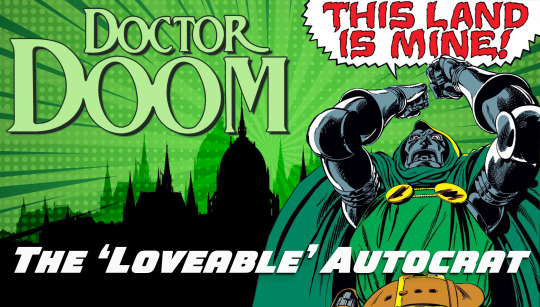
Fantastic Four #247 is quite an issue. It impressed me so much, I decided to dedicate a whole post to a single issue. If you’ve been around for a while, you know I almost never do that. There’s usually not enough to say about just one single. And yet, this one forced me to reflect on real-world history and very controversial ideas presented in the book.
What’s Up
In this issue, the Fantastic Four are forced to help Doom reclaim his place as the monarch of Latveria. Since he was defeated by, well, also the Fantastic Four, his rightful (according to him, obviously) place has been taken by Zorba. Doom can’t think of anything better than taking FF on a tour of the new and improved Latveria in order to show them how much worse life without Doom actually is.
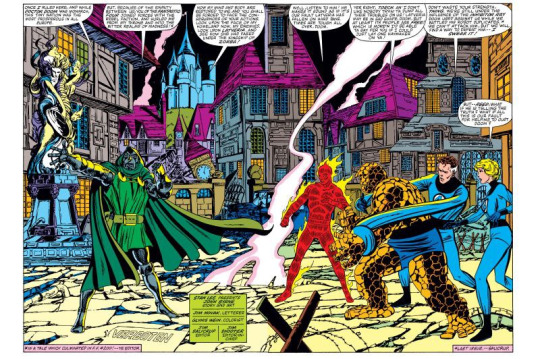
Now right off the bat, I have plenty of issues with this whole premise. First of all, Doom is a dictator. A nasty, unapologetically evil dictator, whose country is messed up no matter which way you look. We know that from the issues #84-87 in which the FF with Crystal on their team, end up traveling to Latveria to witness the beauty of Doom state. It’s not a pretty picture either: it looks like the land of the free, dressing like it’s the 1910s instead of 1960s, and fachwerk.
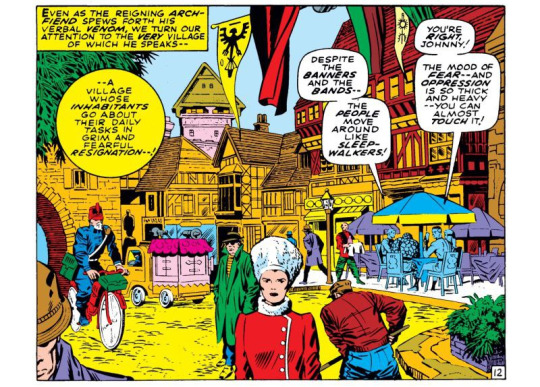
It’s impossible to hide the fact that the people are brainwashed and afraid of their own shadows.
You are free to call me out on imagining too much, but we all know exactly how these states function.
The Background
In Latveria, the people are forced to love and praise Doom. As long as they keep their head low, do their job, don’t ask for anything, and don’t cross Doom directly- they can live a normal life. This illusion of normalcy comes from everyone knowing their place and the rules to follow. And on paper, it even sounds like a textbook Utopia. It's anything but.
In one issue, for instance, Doom is exercising a favored trick among his peers: a peasant bumps into him, and Doom pretends to forgive him.
But we as readers aren't that easily fooled. He's obviously terrified because he knows the rules, and the main one is to love and obey the "leader". Already sounds culty if you ask me. But what this does in terms of narrative is it establishes the condition of Doomism — his state is built on fear, not on respect.

When the FF approach the border, they are immediately informed that neither side (neither the soviet bloc nor the democratic countries) can protect their people within Latverian borders. Latveria does not recognize any international agreements or laws which means absolute, unlimited, uncontrolled power in one set of metal hands. If you underestimate the severity of it, imagine that your absolute authority on all matters including basic freedoms is one man who may or may not be insane.
Like any self-respecting dictator, Doom has a private guard. The one that shoots people if they try to escape his land (which hey, is one of the basic freedoms, shocking.) Doom is clever enough to know what he’s doing, and not nearly naive enough to imagine that if he had allowed his people to move about freely, they would move outside the border and never come back. You can trust me on that.
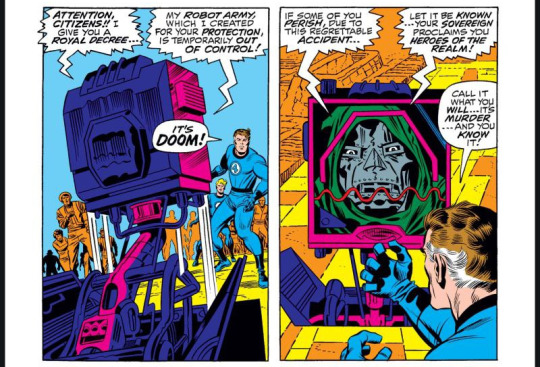
When Doom is once again consumed by his desire to destroy the accursed Fantastic Four, he doesn’t think twice about sacrificing a whole village of his “beloved subjects”. And even before that, when his private bot guard gets out of hand, he even informs the populace that anyone who dies would be considered a hero. Sounds vaguely familiar, doesn’t it? If it doesn’t, consider yourself lucky. But keep in mind that the whole situation is solely Doom’s fault. And he handles it in the worst possible way with little regard for his people.
None of this screams “a leader who truly cares.”
After reading this issue I figured it would've been better and made Doom more sympathetic if his subjects were actually happy. He could've been established as a just and respected leader, especially considering how his predecessor mistreated the people.
Even with all that, It's hard to imagine such a scenario since power corrupts indiscriminately. Sure, that could've given a complex twist to his character as well as added conflict to the decision the FF ultimately had to make. It could have been a commentary on cultural and historical differences since:
a: monarchies are not that rare in Europe.
b: Latveria was surrounded by communist states, so it had enough struggles as is.
That, of course, didn't happen and we got a plain and simple dictator, who follows every other page from the dictators' handbook. A very black-and-white view that was not uncommon for comic books in the '60s and the '70s.
Changing Spots
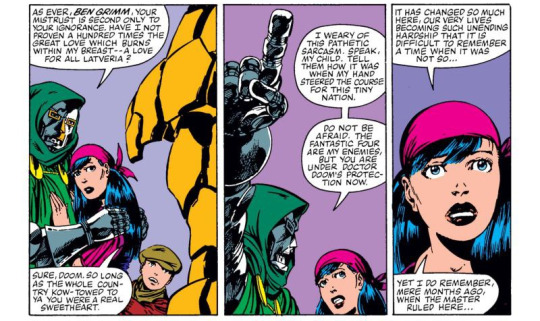
In issue #247, John Byrne takes it upon himself to retcon the essence of Doom. This makes sense, the ‘80s have elevated comic book narratives and gave depth to many characters.
Doom was not an exception. With the FF walking the streets of Doomstadt, we see the devastation that his successor brings to the land. And to top it off, we hear the tragic story of the last few months since Doom has been ousted.
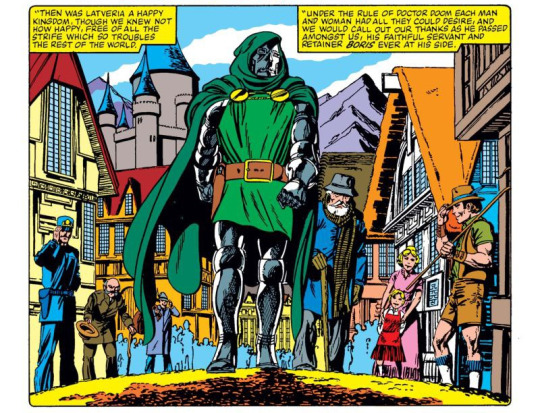
Zorba Fortunov is the heir apparent to the Latverian throne. His father and brother were both murdered by Doom but you shouldn’t feel too bad because they were terrible people and even worse rulers. So is Doom, but we know Doom and we don’t know those guys.
Doom also tortured Zorba (because, and I don’t want there to be any confusion, torturing your political opponents is exactly what Dooms do.)
Now initially Zorba was portrayed as a member of the resistance who was looking to restore democracy in Latveria. Well, restore would be a loud word. Long story short, with the help of American superheroes (who shamelessly collaborate with the government) Zorba comes to power.
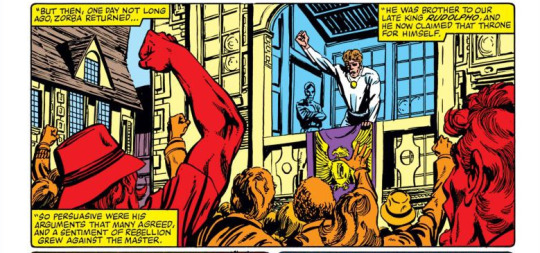
But democracy is apparently too hard to handle for the state. Because turns out (according to Doom and his loyalists), the repressive laws were actually for the good of the people. They were too afraid to commit crimes. For some reason, they also immediately stopped working which may or may not indicate forced labor. And the ‘prosperous nation of Latveria’ fell into complete disarray. That’s confirmed by a few destroyed streets and fearful citizens but other than that, there is only Doom’s word to prove that.
This is a great time to note that any major economic transformations are risky and may result in poverty and a rise in crime. Especially in a society that’s not prepared to said changes in stages. We have actually seen that with post-soviet states.
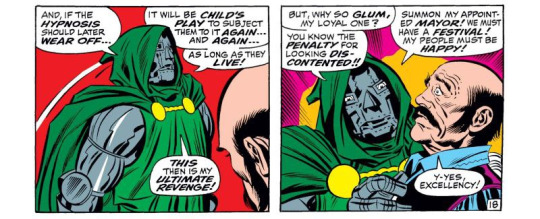
Either way, Zorba revoked Doom’s cruel laws and punishments (from what we have seen so far, they include murder if “the master” is in a bad mood and you are in his proximity). People were promised an election (which it seems like Zorba really planned to have.) But some happy and liberated citizens of Latveria chose violence and it became so bad, Zorba declared martial law. Which naturally gave him all the power… that he was supposed to already have as an absolute monarch. But who cares?
Zorba reprogrammed Doom’s personal guard to police the streets and they are referred to as ruthless (as opposed to Doom’s tender and caring ones?)
So slowly, learning this story, the Fantastic Four figure that the devil they know is actually pretty good compared to the devil they helped install. Despite there being little difference except the fact that Doom was planning to rule till the day he dies (and possibly after).
And then we see that he cares so much, his main priority is restoring Latveria to its former glory.
But… why?
Of course, my main question is the idea behind this whole narrative. Are we supposed to believe that a shaky democratic state is much worse than the iron rule of one leader with order? Or is it something very specific to the people of Latveria? If Doom is so great, why does the Fantastic Four fight him relentlessly when he tries to take over the world? And why do they feel entitled to repeatedly make decisions and instigate conflict on behalf of the people of the country?
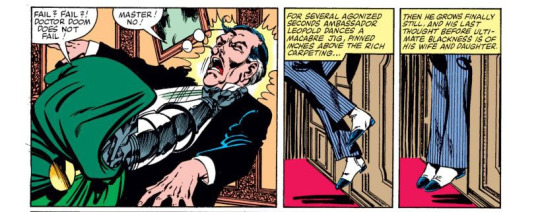
I don’t have the answer, I see the story and the attempt to rewrite Doom’s history into something that can justify keeping him around. But if he’s a dictator, if he’s a tyrant, we probably shouldn’t romanticize him that much. Because once again, I want to look at the Latverians here - we rarely really do. They went with a democratic choice, with a possibility of change. And there must have been reasons for that, I mean they were NOT happy. In one of the issues, Doom murders the Ambassador of his own country (ok it was a doombot but if you ask me, same difference). So how exactly does that align with the just leader narrative?
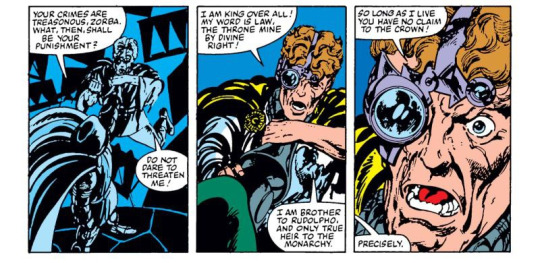
If the idea was to not interfere and let things flow naturally as they are supposed to, why does the FF help reinstall Doom?
Let’s be honest, Zorba doesn’t care much for the people. He proves it in that same arc. But neither does Doom, that’s no secret. And neither do Reed, Sue, Johnny, or Ben. Everyone is this story has their own interests and not one of them is the prosperity of the country.
They might be able to rewrite Doom and turn him into a good leader, I wouldn’t be surprised because I’ve seen heroes shake hands with him later on. But it still will always feel like a hypocritical joke.
The suggestion that Doom might be better for the country is one I have a hard time with, on so many levels. We can’t trust the collective amnesia of the populace, caused by the trauma of drastic changes.
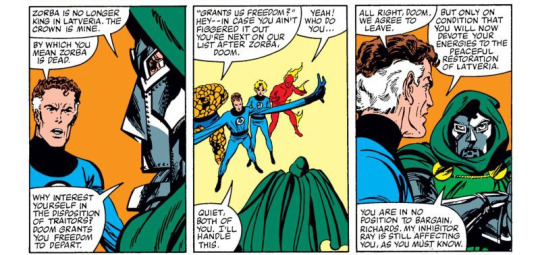
At the end of the day, either option is bad for Latveria. Doom is vengeful and bloodthirsty and so is Zorba. Both occasionally had good intentions. In both cases, they didn't matter. Zorba was the rightful monarch, while Doom was an usurper yet both revolutions happened with the participation of the FF. And it doesn't seem like free Latveria is this team's priority.
#comics#comic books#marvel universe#long reads#marvel comics#marvel#fantastic four#doctor doom#victor von doom#latveria
15 notes
·
View notes
Text
Daredevil by Chip Zdarsky Pt.2
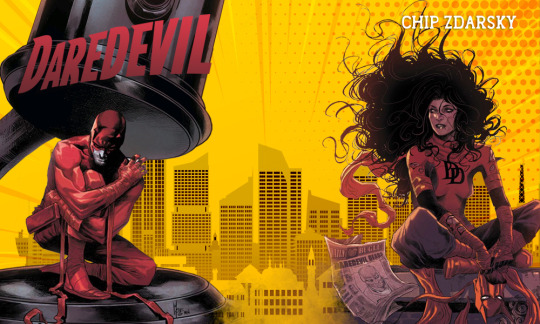
This doesn't work without Part One
If you have read it, let's get back to the characters... and there are still serious spoilers
Daredevil/ Elektra

This lady is working towards her redemption. After she showed up to help Matt and recruit him for The Fist to (be the king!), she gave him a chance to go to prison. It sounds bad but in their world, I guess, it was a good thing. She gives him the opportunity to decide whether he wants to pay for his crime by taking it upon herself to protect Hell’s Kitchen. I was legitimately audibly surprised when she showed up at the hearing and let Matt know that she both knew his identity and bought 90% of the neighborhood.

She had ulterior motives, of course, but it still felt genuine. It’s something she would never have done before and something that shows us and Matt that she’s ready for change. Speaking of, this run is full of wow moments. The next one actually comes right after, when Elektra becomes the new Daredevil. She wanted to earn Matt’s trust so she not only took care of his neighborhood but stuck around to do his job while he was resting in a cell block. With the costume and everything.

The detail I loved most was how she modified her sai to be blunt. It’s a small thing that I hadn’t noticed right away but it just proves the point – she wants to step away from being an assassin and do something good for a change.

She goes full Bruce Wayne too, she gives away jewelry and adopts a kid. That doesn’t last because, unlike Bats, she realizes quickly that all the violence and “channeling your anger” don’t do any good for a kid.

Elektra makes a pretty great Daredevil. She feels like a more solid fighter, more likely to win. “Without fear” applies to her more because she’s done it all: died, killed, came back, succumbed to darkness, fought it. She has nothing to fear but her own limitations. Which she does, it’s quite a change for her to limit the violence and refrain from killing. But she is wearing the DD logo and she is representing him. She shows the people of Hell’s Kitchen that even without him on the streets, they are protected. That’s a hell of a thing.

Elektra is new at that and is looking for her own take on Daredevil. She isn’t like Matt at all.
Cole North

Now he’s a new character and one of the best ones in a while. Plus, he’s also a narrator in the run. He arrives as a cop from Chicago who has to catch and arrest Daredevil. He’s a very by-the-book detective, he believes in the procedure and well, he’s in for a ride. Right away he encounters crooked police on one side, a criminal mayor on another, the whole criminal underground, and vigilantes to top it off.

He sees Daredevil as someone who positions himself above the law, which comes at a time when Matt is starting to doubt said law. And they make for an interesting dynamic. Daredevil saves North from a bunch of his colleagues and kickstarts North’s downfall as a cop. Which is hey, also his rise as a decent person. Cole North is a fantastic addition, truly. He’s something that Daredevil’s been needing for a while since he never listens to Foggy or his girlfriends. He even, and again I’m jumping ahead, appoints Cole as his moral compass. A pretty decent idea, although Matt will probably mess that up too.

Back to Cole North though. He goes through a transformation that’s masterfully shown through his thoughts (and let me tell you again, how much I appreciate different perspectives) and actions. It’s not his book but he’s one of the most memorable characters there. And despite never learning Daredevil’s true identity, he stands by his side, believing it’s possible to change the world.
The next step is actually leading towards what seems to be a massive event. But I’ll be ready to talk about that after I finish it.
This, Zdarsky’s run and Devil’s Reign - an event dedicated to heroes battling Fisk, are some of the best Daredevil comics out there. They don’t play around with Matt’s lighter side anymore and I, personally, like it. There’s something incredibly stylish and dramatic about Daredevil’s life going all the way off the rails.

It leads to darker art and atmosphere, to more mature stories - I like that and that, to me fits the character.
Zdarsky carefully navigates his way through further character development steps to lead to a relevant discussion of social/political issues. It feels well-paced and allows the narrative to flow freely.

The fact that he introduces multiple narrators makes the story richer. We don’t just get one perspective and thus, one point of view, we are forced to at least attempt to sympathize with everyone. This pushes readers out of their comfort zone and gives additional depth to the villains.

Meanwhile, Daredevil himself gets something new, something he hasn’t done or tried before. And even then, he still can’t escape his patterns. It’s as beautiful and entertaining as it is frustrating. But this is the kind of frustration you’d experience towards a friend who keeps making mistakes. That feels familiar and in a way, nice.

The main artist on this run is Marco Chechetto. His work feels heavily inspired by manga but at the same time, it utilizes the best elements of Western comic book art. This symbiosis works well for this specific run. Chechetto’s ability to brighten up the color palette and darken the image when needed is something that allows the stories to play out both in text bubbles and in frames. It adds emotions and even adjusts them. Splash pages and dynamic battle scenes feel like real action. Throw in some street views and pretty epic full-height shots and you get a truly epic book.

There are temporary artists, who take over for one or more issues like Mike Hawthorne. In his case, the change was hardly noticeable because the main color scheme was still followed. I believe in terms of style, there were just a couple issues by another artist that felt off to me.
All in all, like I said, one of the best Daredevil runs.
#marvel#marvel comics#comics#comic books#marvel universe#long reads#comics reviews#daredevil#elektra#elektra natchios#woman without fear#Cole North
15 notes
·
View notes
Text
Daredevil by Chip Zdarsky Pt.1

It's not easy to sum up a run like this. Nah, it's actually pretty impossible. It's a long road with so much going on with so many faces, you have to record every single one of your thoughts. So I’m gonna go character by character, taking every arc and dissecting it.
I have, in fact done it a while ago, right after I finished the run, but it took me some time to post it. And I wanted to make it feel more like a review but that didn't quite work out, so here it is, my essay or analysis of some of the character arcs in this run. Spoilers ahead too!

Zdarsky’s run finds Matt right after the short rehab series. And I have to talk about that a little: the truck that kicked Daredevil out of the game, poetically replaying his childhood accident, left him dealing with all the old injuries. In DD’s line of work, those tend to pile up. So the few issues were a short detour into Matt’s identity crisis as he was about to give up and had to seek help from his fellow Defenders. It was a very recovery-focused story with flashbacks and the fears that haunted him. For a man without fear, he sure has plenty of nightmare scenarios so questioning and reevaluating this status is a constant process for him. This idea circles philosophy but to me, it just reminds again and again of how much Matt Murdock depends on the way people see him.

When Zdarsky’s run starts, Matt is already going out at night and throwing his clubs around. But he’s not exactly living his previous life anymore. Here, the status quo is fully restored after Waid’s detour and the brooding hero on the roofs in the rain is back. Well, almost back. He can’t fully heal his body or his mind so he ends up accidentally killing a man. And then Zdarsky finally pushes Daredevil into the trap that's been sprung for him ever since he killed Bullseye. At the time, I was a bit disappointed that Waid allowed Matt to walk away into a new life, never having to deal with emotional repercussions. It felt to me like he was repressing that event so hard, his entire personality had changed. While the run was good, it felt like a bizarrely loud cry for help. I felt like that was not Matt, at least not the ever-guilty martyr we all know.

But now, here, he gets a chance to live through this hell. The beautiful part, in terms of narrative, is that Daredevil right away becomes erratic and paranoid: he goes digging through his enemy list, convinced that someone had set him up. And he fools you easily. Despite him being off his game I truly thought there was a Fisk handprint or just The Hand behind it. But you know what? No. It was just an accident. Probably caused by Matt's lack of trust in Daredevil or his not being at 100%.

DD gets so bad, he actually ends up getting a talking to from none other than Spider-Man. Aside from the usual suspects that is. Which, think about it, all heroes have gone through trauma at one point. But compared to a spiraling Daredevil they still seem very together. Granted it's his book so the main drama has to come from him.
There’s a moment when he’s in a room with Jessica, Luke, and Danny, and he calls them all murderers, quickly correcting the ‘you’ to ‘we’. It’s like a new light in which he sees the whole superhero game: like he thought they were truly above the law because they made no mistakes. So yeah, after all these years he saw for the first time how flawed each one of them truly is.

What he refuses to see is that they are all working through that, not dividing the world into the good and bad. Meanwhile, Matt has Daredevil on a pedestal as someone who must never allow the line to become blurry.
Matt's disturbing as hell. And yeah, have to admit I like him more when everything is awful, simply because he always knows how to make things worse.
For a brief time, Matt hides the costume in his closet and works as a parole officer. But it turns out he is actually terrible at compartmentalizing and he's even worse at self-inflicted penance.

I believe the culmination of his incompetence in life is an affair with a married woman. Married to a mob boss’s son. It's truly classic Matt Murdock at this point - got no one to cheat on, well, at least she does. He is Exupery’s drunkard and he's brilliant at that. He wakes up next to Mindy thinking about the terrible sin he’s committing. Gotta give her credit though, she gave him a piece of hell for making it about himself.
And then his circle of violence as he calls it (courtesy of late Vanessa Fisk), pulls him back in again.
He has doubts and fears about putting on the costume again and we'll, it's hard to blame him. But he still lives in Fisk’s city and the city is getting worse every day.

When Matt came face to face with The Purple Man, he said that the thing he fears the most is hearing all the tragedy and doing nothing. Zdarsky just puts him in this reality and Matt's got no other choice than to put on the mask. Before he fully embraces it, he trains with Elektra. Did he break up with Mindy? No, of course not. He just ghosted her until she needed help. The good ol' Matt.

But with Elektra, this time it's different (not really - she has her own plan as she always does.) I have to admit, the more they get together the more I realize one thing - Matt really can't break up with women. They have to die, otherwise he’ll be hung up on them for years. Elektra is the love of his life no less than Karen was. She just came back from the dead, unlike Karen, and I’m pretty sure deep inside Matt thinks it's for him. Plus, she knows his identity which makes it so much easier. And she's deadly which makes her so less killable.

But most importantly Matt’s obsessed with Elektra because she's from his past and he’s notoriously bad at moving on from his past (see Exupery's drunkard again). Here’s why I kind of root for them: I do like the adversary/lover connection they have and they exist in the same world. Can they make it work? I doubt it.
Before I get too deep into more of Matt's disastrous relationships (and believe me you, there is more) I should refocus on the arc.

We got Matt running from the law while making adjustments so he could represent that same law. And he has an interesting new addition to the cast in the form of detective Cole North. I’m gonna talk about him later since he's one of the narrators in the run. But North is hell-bent on holding vigilantes accountable and Daredevil is his idée fixe just as he is for Fisk.
Daredevil manages to sway North by saving his life as corrupted cops attempt to kill him and that leads to three interesting events.
One - his parolee learns that he is Daredevil. And his parolee is none other than the brother of the man he accidentally killed.
Two - North starts seeing him as a protector rather than a criminal. But he still wants to hold him accountable.
Three - it sets the tone for the rest of the run, showing the cracks and imperfections of the US criminal justice system.

Either way, that day Matt goes free. And when he puts on a costume again, he is convinced that now he's gonna act smart (because Elektra told him to gather information before leaping into action, duh. All that education and you couldn't figure it out on your own…) It's also a different costume and Matt even convinces everyone who’d listen and a couple people who won't, that he is now a new and improved hero who is not Daredevil at all. Yes, he actually believes it and I think it's still his desire to wash his hands off of everything connected to the accident. He thinks he sees things clearly now but it feels like he's never been more blind. Yet somehow, he will be.

This repetitiveness becomes very noticeable when you read through run after run. It’s a very clear pattern that Matt goes through: every time something changes he makes the decision. This time… this time… this time… and it always comes back to the same conclusion.
He immediately gets duped by Elektra into stealing money from the bad guys, of which she pocketed some. And then the bad guys rain Inferno upon Hell’s Kitchen.

That's a fun little event during which another one of Matt's exes, Typhoid Mary, reappears: prior to that she's been therapied into a nice nun who's been helping Matt whenever he ended up in church. The first time I saw her I thought “Oh no, he's not gonna sleep with a nun…” but then, he already had. Uhm, anyway, the nice uplifting moment was the people of the neighborhood dressing up as Daredevil, turning him into a symbol. They'd been doing it for a while and some had been moderately successful too. But when the battle was won, one of them died in Matt's arms, so he turned himself in as Daredevil.

Now that's the thing, that's where the main idea of this run starts really growing. And not because Daredevil goes to prison or refuses to fight for his freedom, but because of what's awaiting him there. It's not the superpowered villains, it's all the people he’s been sending there for years. It's such a simple thing - to take these “street level” bad guys, put them face to face with Daredevil, and tell their stories.

Daredevil in jail is a stupid idea. Smart from the narrative point of view yet stupid for him as a person on many levels. First of all, he is doing it out of misguided loyalty to the law. He's still a lawyer after all. He's also religious but he kind of sorted that out for himself already. He says he wants to show everyone how even superheroes have to be held accountable if they step out of line.

He wants to feel good about himself and again, a part of me thinks he wants to feel like he's better than the others: he loves that moral high ground, and whenever it shakes underneath his feet, everything around him falls apart. Mostly because he destroys it, but he doesn't focus on that.
Cole, Kirsten (yeah, she's back too), and Foggy, they all tell him he's wrong. And they are absolutely correct too. He wants to be an example, sure, but he really needs people to see him the way they did before. It's not about his guilt, he's been forgiven in fact.

The one big regret I have is that this run and this prison time didn't give him more therapy. Because the therapist calling him out on his usual BS was incredible. And she, along with another inmate reminded him that he's fooling himself and trying to fool others. All that makes more sense considering he still hides his identity, so whenever he chooses to leave, his crime and his time won't affect anything. None of that will ruin his life.

The way the story leads to this social or rather political issue, it's very organic. It's something he’s been dealing with for years as both his personas: the revolving door between a police station and the streets, the poverty and desire for a better life that lead to crime, the mean streets. He's the perfect hero for this story and his flaws are most vivid here. He had both put people in jail and kept them out of it, he'd been a mayor, and he’d been accused and stood trial. But all of that he had been doing from his high horse.

The truth in that story is grim and realistic - prison isn't helping reform anyone and only serves billionaires in their quest for more wealth.
As Daredevil discovers that and makes a deal with the FBI, he gets released. And once again, he wants to go for that one big win. He always falls into that same trap, he always attempts to stand alone or with friends and win everything, save everyone at once. He’ll keep trying to, all the way to The Fist saga.
But to get there, he needs to step over one considerable obstacle.
Wilson Fisk

Like I said, Daredevil and the rest live in Fisk’s city. He is still the mayor and he is going after all vigilantes and I mean all, including the Avengers. But that’s just a part of it. Fisk has an interesting story as he decides to move from the underworld politics to the real thing. He makes a decision, he retires the title of Kingpin of crime, but he forgets the one crucial part – he can’t retire his persona. He will go on to the next level with his hands still soaked in blood. And that’s something he shares with Matt: where Matt needs to be absolved, all Fisk needs is to just turn around and pretend he’s done nothing wrong.

The ironic detail is, he’s so used to doing his dirty work himself, he finds it impossible to fit in with polished high-class criminals. Politics seems like a natural next step for him but somehow the shadow games turn out to be more than he can chew. Thus the Big Bads of this run are Stromwyns - the richest people in New York. They pull the strings and even Fisk struggles with that idea.

In all this, he has a few defining moments:
He wages war on superheroes, including mutants, which leads to X-Men Devil’s Reign
He goes to fight on the ground during Inferno (which was organized as you might have guessed or known already, by the Stromyns).
He kills Mike Murdock thinking he’s Matt Murdock.

Oh, right I forgot to mention that Mike’s back. And he is seemingly real now, has his own arc, although still can’t escape the title of a spare Matt Murdock.

Anyway, back to Fisk. Of course, when the time comes for reelection, Fisk wants not just to run but to guarantee his victory, which is not surprising at all. I mean take a criminal who gets a fraction of power, would they ever let go of it? In this regard, Fisk is your classic villain. And just like every other villain, he decides to cheat and use The Purple Man’s power to sway the voters. All of that leads to his ruin and retirement.

But not before he marries Typhoid Mary. Can’t call the ceremony lovely really because they both creep me out and I’d like them or at least Fisk to pay for his crimes. It’s not just the fact that he never does or it never sticks, it’s that later he’s received diplomatic immunity from Krakoa, and sure, he helped them during Fall of X and the drama with Orchis. But it’s still the same damn Kingpin. That hasn’t changed and he will return to make everybody’s life hell again.

Why? He’s absolutely evil and we see that in a panel during Devil’s Reign. There’s no non-evil or non self-serving for him.

Yeah, Fisk and Mary rowed off into the sunset but not before Fisk killed Mike. And really, that’s another opportunity missed by Matt. Could’ve played around scaring him in both his personas instead of going after him right away and revealing his existence. But I get it, he had other engagements including his actual engagement to a woman we all know all too well.
I ran out of the images limit, so there is a Part Two.
#marvel#marvel comics#comics#comic books#long reads#comics reviews#marvel universe#daredevil#matt murdock#wilson fisk#kingpin#typhoid mary
20 notes
·
View notes
Text
Fantastic Origin (Reed Sucks)

Let’s do it, let’s kick off the Fantastic Four review journey.
The first ever run of Marvel’s first family aka the team I had been actively avoiding until recently.
Most of Lee/Kirby books are extremely different from what we see in the comics today. You could easily attribute that to the days of yore or just the fact that these books have served as stepping stones towards bigger and more complex stories. Or you could take them for what they are.

Right away I will have to get misogyny out of the way. It’s there and it’s ugly. These books are filled with ridiculous stereotypes and absolutely unacceptable degrading behavior towards women. It’s all the more upsetting when you get to read fan letters from women, they hint at that constantly.

I gotta say, it worked too because when Crystal became a part of the team, she was relatively badass and was treated with more respect than Sue. But dammit, poor Sue. You can try and convince me that Reed is a good husband but that won’t help a bit. In a world where literal supervillains exist, he is definitely not the worst human being but since he’s being portrayed as a hero, I’m gonna accept the fact that he’s trash.

Of course, I see what the creators were going for: Reed was supposed to be a hyper-focused, single-minded, science-obsessed team leader with the weight of the world on his shoulders. He was supposed to be flawed but sympathetic.
Especially compared to his beloved Sue who was supposed to be a loving and caring homemaker with her invisibility power being a reflection of her relationship with Reed. As in he only sees her when she’s in danger.

The way it looks now, 60 years after the cosmic rays incident, is very different.
Sue is a young woman, seemingly younger than Reed, who somehow stumbled into a relationship with a man who treats her as a status symbol. She’s a tag-along, something pretty to walk with, have at home, and look at when it pleases him. Because she’s younger (bear with me, I’m only assuming this based on the Lee/Kirby age), she is very susceptible to his influence and opinions, there’s a power misbalance and she doesn’t really know that things could or should be better. Which is kind of easy to assume, considering her mother was dead and her father was in jail. She also had a brother in high school to take care of and Reed was successful and rich.

Then after she got powers, she kind of got permanently stuck with him, and that trauma bond became even more dysfunctional. She did assume the role she probably saw in the media at the time, overly caring about everyone but herself, and she accepts material substitutes for actual comfort, such as shopping, because that’s what’s been said and taught to her.
Her relationship with Reed is passionless too, hence when Namor shows up, she entertains the idea of him. Although, let’s not forget that he keeps kidnapping her and trying to convince her to become his queen of the seas or whatever. Maybe if he was less straightforward and didn’t try to kill her brother in the process… who knows?

But he does, meanwhile, Reed is putting that good-for-nothing brother of hers through school, so she chooses Reed. She even marries him, entrapping herself in a loveless marriage. And after two years of horrible home life with barely any time to get to know whatever she’s been wed to, she gets pregnant. All in all, at this point, at that time, it’s over for her. And as a reader you know she doesn’t escape that. It’s pretty tragic.

Reed is a scumbag. Yelling at Susan is just part of it, he also acts like he’s the boss of everyone (which I do get when it comes to Johnny and Ben, who are let’s just say irresponsible.)
He constantly sticks his nose into things like the negative zone, causing meanies like Annihilus to show up. He keeps using Ben or The Thing when he needs and then swears he’ll turn him back. It gets repetitive and no one can really trust him. He pretends to act like a hero after causing a problem and keeps trying to sacrifice himself forgetting his wife and eventually son. Bro, you got responsibilities over there!

I believe that’s the intention but Reed is not that different from Doom, except Doom actually has a sob story to explain his obsession with science and the occult. Reed… at this point in the run we don’t know if he does or where his assholery comes from. All we do know is he’s an equally terrible leader, husband, and friend. Bet he’s not much of a father either.
But hey, at least he’s putting that good-for-nothing Johnny through school.

Ben is irritating. We’ve discussed it at length with several people, how so many people can relate to him and consider him their favorite character. But Ben Grimm is awful. You know what? I think the unstable version of him that was around for a brief moment when he could switch into The Thing and back, that version is the real Ben Grimm. If anything, his insecurity is holding him back in that anger. When he gets both strength and his human appearance, that’s when you gotta run for the hills and summon the Hulk to put him down.

Ben went from petty, insecure, and angry to overcompensating and calling himself pretty and lovable. All the while his paranoia regarding Alicia and her love for him is growing more and more bizarre. He really doesn’t trust her when she says that she likes him as The Thing, he claims he wants to be Ben for her but hey, she’s pretty uncomfortable with Ben so there’s that.
He did act better than Reed would’ve when he thought Alicia had chosen Silver Surfer but then he ghosted her and threw a tantrum every time Surfer popped up. Have some self-respect, Ben.
What pissed me off the most is the way he treated Franklin seconds before he found out his middle name was Benjamin. Like, seriously? You’re taking it out on a baby? Besides, neither Sue nor Reed owes you anything. Well, maybe Reed does. But it doesn’t help that Ben keeps getting into fights with that good-for-nothing Johnny.

Johnny is good for nothing. He’s an ok kid I suppose but he doesn’t attend school and somehow ends up in a university (which even managed to piss off one fan! Seriously, don’t ignore the fan mail if it’s there!) Then he spends exactly one semester, meets a friend who participates in his whacky adventures for like a week, and forgets this friend exists. He also forgets the school exists.

Johnny is either acting out at home, fixing his car, or chasing after girls. Until he meets Crystal and immediately becomes obsessed with her, which no one really cares about. Then Crystal gets stuck under a dome with her merry Inhuman family, and he broods and throws tantrums. They are torn apart and brought back together, and then are torn apart and then brought together, it’s a whole X-men level soap. I actually liked that.

And out of all the villains I’m only gonna focus on Doom. Don’t get me wrong, Galactus is forever the star, but let’s talk Doom.
He’s an interesting fellow but I don’t get the massive fan base. Dude’s a literal dictator of the worst kind. He experienced dictatorship on his own skin since childhood and he grew up and enslaved his whole country. I would understand if he brought prosperity and happiness to them but that? I was actually pretty impressed by the Latverian arc, in which the FF went to Latveria and were depowered and treated like Doom’s dear guests. It was a creative way to draw a little image of what this kinda system is and how it functions from within. Doom rules by fear and they experienced that fear, they even almost lost hope. I would’ve done this arc a little differently but hey, I’m here 60 years later.
But at least Doom hadn’t killed that good-for-nothing Johnny.

The Stories
That’s what we’re really here for – the silly early villains and the bizarre tactics that save the day. We obviously have some baddies that stood the test of time and a few that didn’t. But Reed’s approach throughout everything is pretty much “let’s throw them into space and hope they don’t come back.” They do, Doom’s been to space twice and even made a trip to the microverse. He’s well-traveled now.

In the beginning, it’s a very repetitive scheme: one issue = one arc, Ben argues with that good-for-nothing Johnny, Sue is there, Reed saves the day. But the arcs stretch to two and more issues and the stories become more and more entertaining. At some point, even Sue gets to save a few hours. Not the day though.
Crystal gets her shining moments, and like I said before, she does very well and almost without Reed’s misogynistic crap.

There are a few stories I liked, Galactus, of course (behold!), the would-be gamer The Thinker, Latveria visit, and the arc in which whatshisface scientist turned himself into The Thing. That’s pretty much the first time in this run when a one-issue baddie realized the error of his ways and made the ultimate sacrifice. Before that, the antihero role was pretty much Namor’s. Speaking of Namor, how’s his “movie” career? That arc was truly wild and smelled a lot like Golden Age comics.

Now if you’re thinking you’d like to read this run, do. But if you just want to know the origins and main encounters, just watch the 90’s show. Not only it covers most of the pivotal stories, but season one has a fantastic! intro song. You’re gonna love it and if you don’t, it’s gonna haunt you till you do.
I’m positive the stories are gonna get better. I was promised they’re gonna get better but I have a hell of a road ahead of me, 300 issues before I get to more modern days, and even more after that. I’m all in.
#comic books#comics#marvel#marvel comics#marvel universe#comics reviews#fantastic four#reed richards#susan richards#johnny storm#ben grimm
9 notes
·
View notes